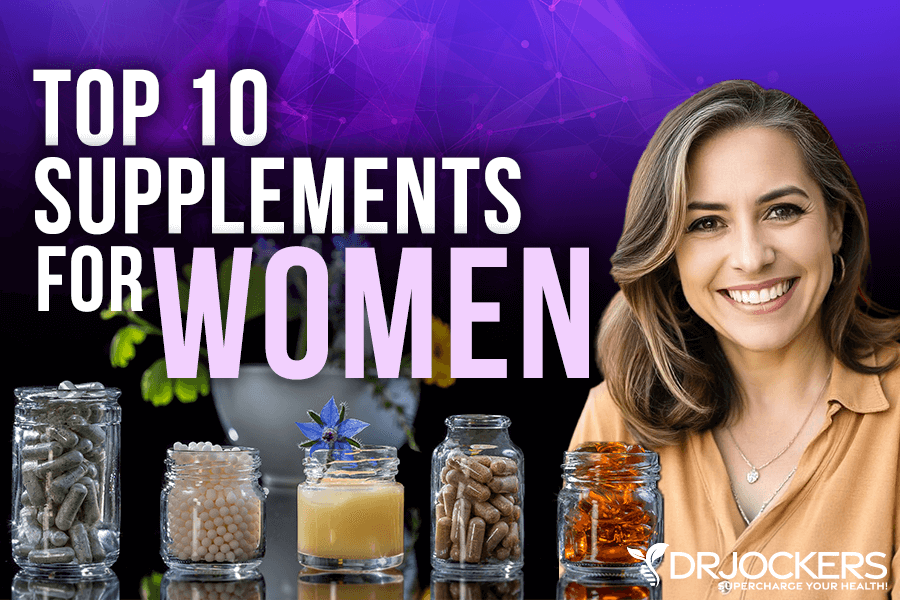 Top 10 Supplements for Women’s Health Concerns
Top 10 Supplements for Women’s Health Concerns
Women’s health is an important issue we can’t talk about enough. Women go through different hormonal shifts than men. This means that women experience some unique health concerns and are also at a higher risk of various symptoms and health issues, often due to the major hormonal transitions between puberty and menopause. Thus, women also need some specific supplements to support their needs and reduce their risk of the main women’s health concerns.
In this article, I will discuss the main women’s health concerns iyou may experience as a female. I will discuss the importance of a healthy lifestyle as a foundation for women’s health.
I will also share the top nutrients and supplements for female health, including magnesium, vitamin D, zinc, protein, amino acids, iron, B vitamins, vitamin K2, selenium, milk thistle, and chaste tree extract. I will share the top three supplements I recommend as part of my women’s health protocol and some bonus products for women’s health concerns to improve your health and well-being as a woman.
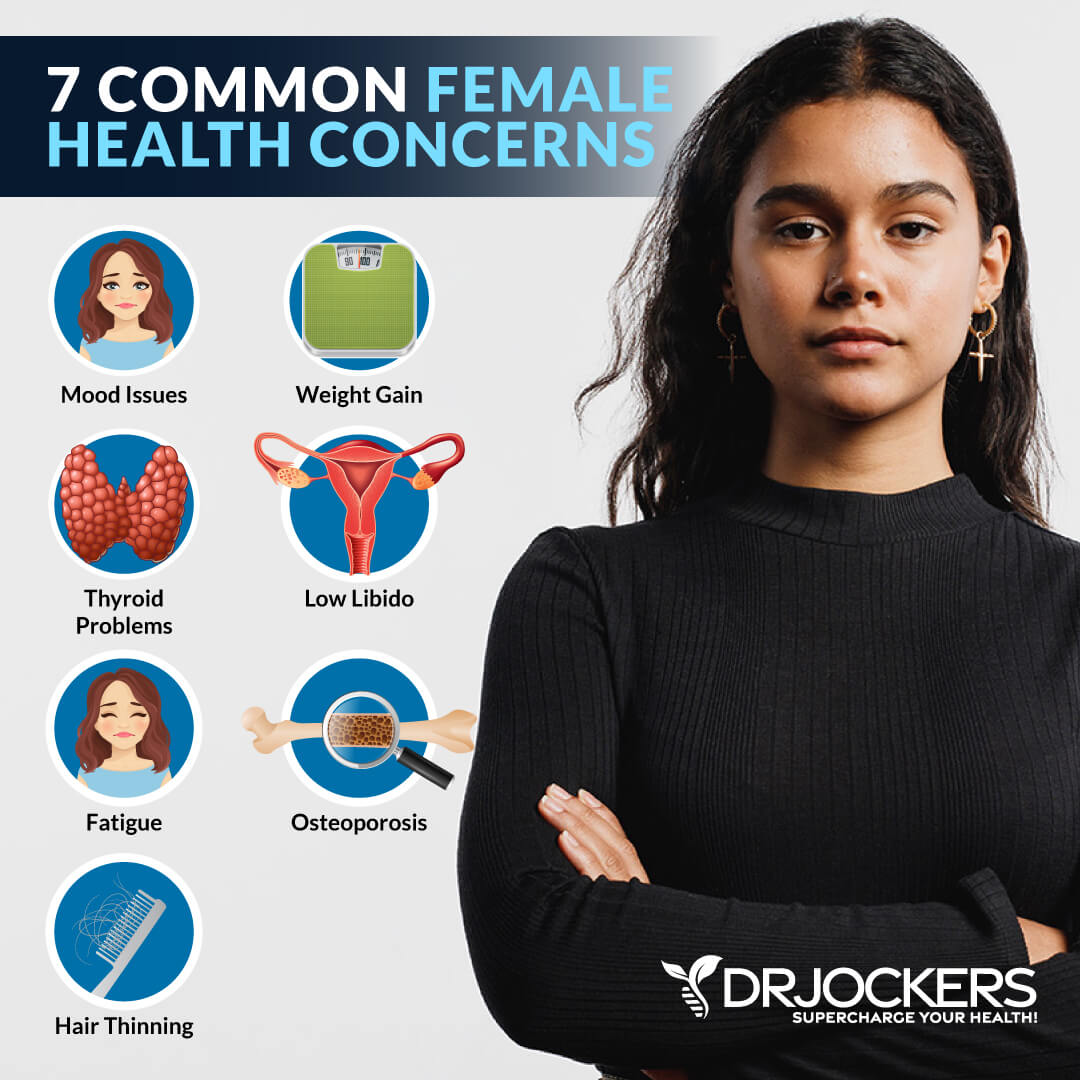
Women’s Health Concerns
Male and female bodies are different. This means that they struggle with different health concerns. Some health concerns are unique to women due to their female-specific organs and hormonal makeup. Other health concerns, though also affecting males, may be more common in women or may present differently.
These differences occur due to obvious differences in physical characteristics, as well as some major hormonal differences. Females experience their first period sometimes during their preteen or teenage years.
In healthy female bodies, they will experience a monthly menstrual cycle and a monthly period for about 40 years, until menopause. During perimenopause, they will start experiencing new hormonal shifts and a transitional period, which will complete at menopause, which is the end of a woman’s menstrual cycle.
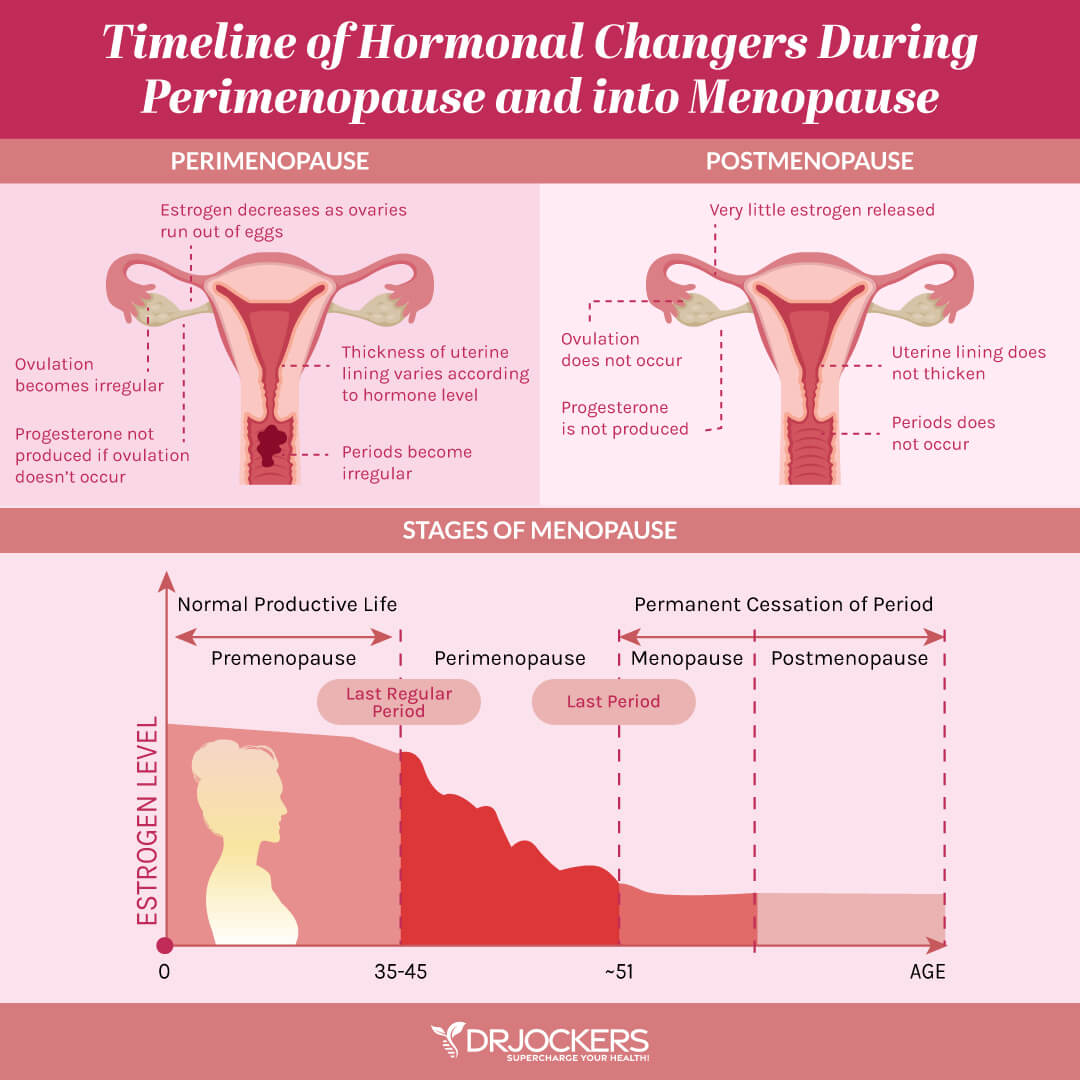
It happens when a woman has gone for 12 months without a period without any other cause, such as amenorrhea. The average age of menopause is 51.
After menopause, women may experience other hormonal changes and health risks that they did during their fertile years. And let’s not forget, before menopause, during their fertile years, pregnancy, childbirth, breastfeeding, and in some cases, miscarriages can put another toll on their body.
Clearly, there is a lot that can happen in the female body. Talking about women’s health and discussing common health issues and health risks is critical to addressing and preventing these problems and helping women thrive. Before I get into the top nutrients and supplements I recommend for women, I want to recap some of the main issues women may deal with.
Mood Issues
Mood issues are among the biggest health concerns for women. Though anxiety, depression, and other mental health issues are not unique to women only, due to hormonal shifts, unique responsibilities in life, and in some cases, societal pressures, women may be more prone to mood fluctuations and mood issues than men are.
Various research studies have shown that anxiety, depression, and eating disorders are more common in women due to a combination of hormonal differences and hormonal shifts, stressors, including trauma, more prevalent in women than men, and a remunerative cognitive style coping with emotional distress (1, 2, 3).
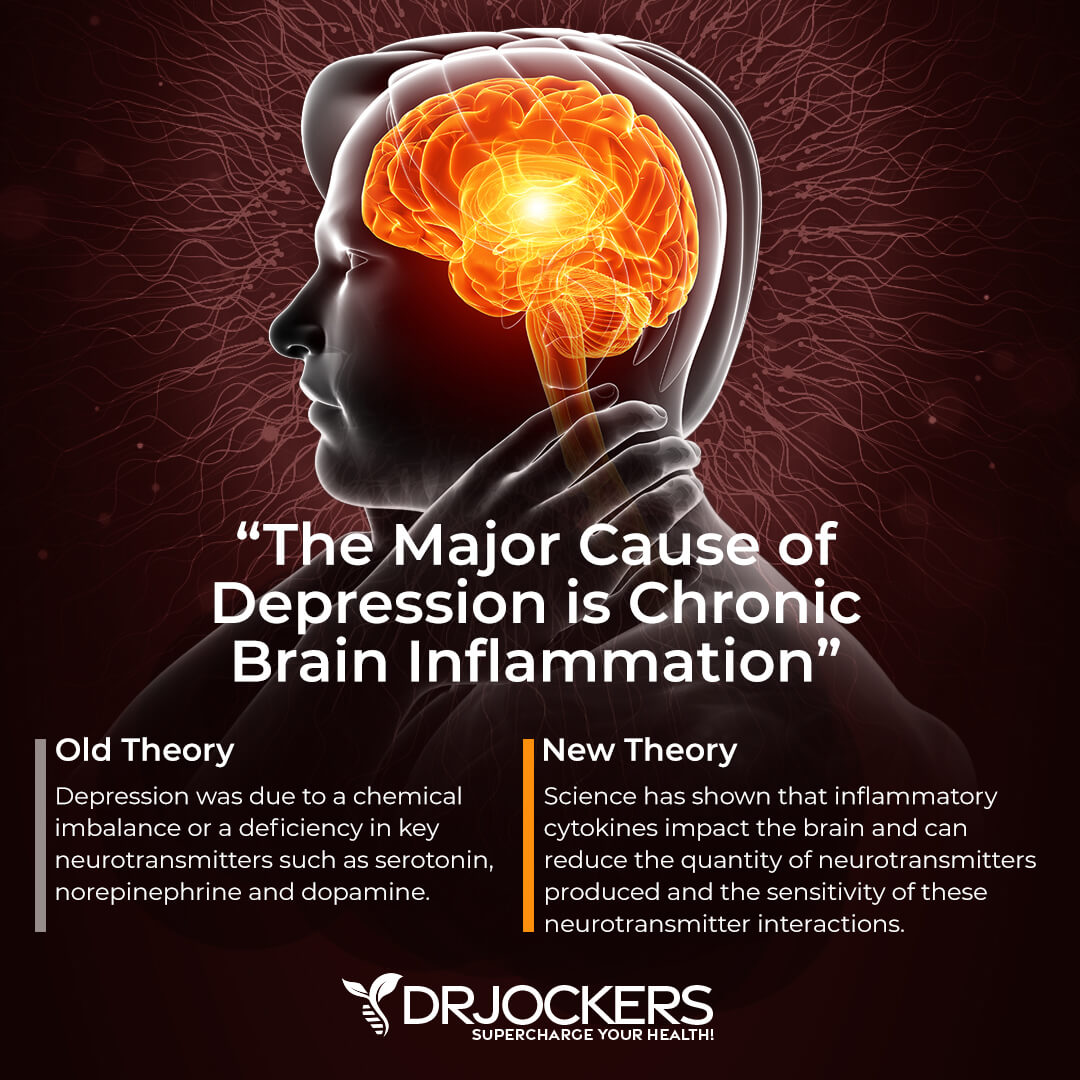
Weight Gain
Weight gain is another health concern that can affect both women and men. However, women may experience weight gain due to various hormonal shifts throughout their lives, including pregnancy, perimenopause, menopause, and various hormonal imbalances.
Weight gain as well as increases in abdominal fat and obesity are common during perimenopause and menopause, which can increase the risk of various health issues, including cardiovascular disease, hypertension, hyperlipidemia, and blood sugar issues (4, 5).
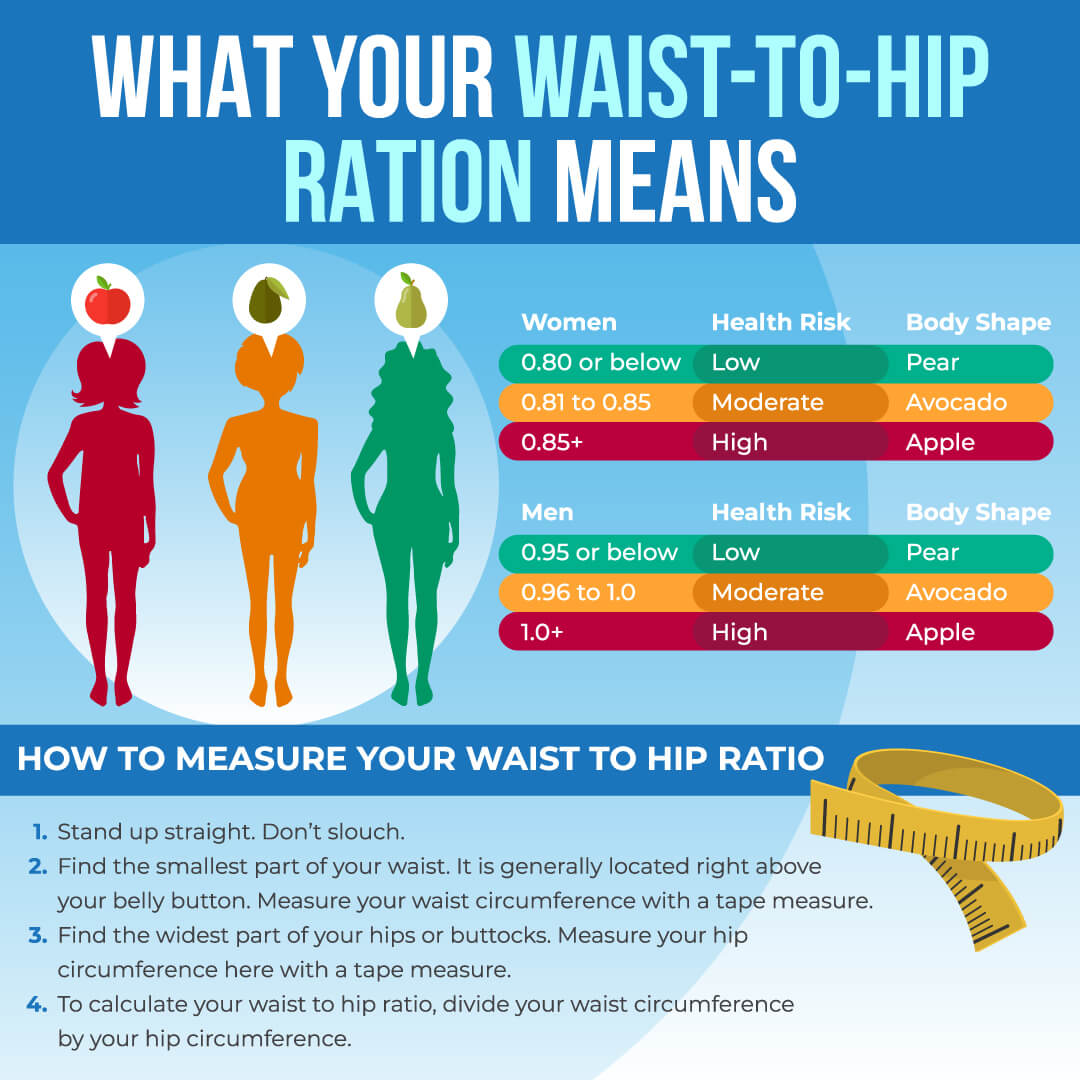
Thyroid Issues
Thyroid problems are another health concern that is more common in women. The thyroid is a butterfly-shaped gland found at the front of your neck. It makes thyroid hormones, which are critical for metabolic, digestive, muscle, bone, and brain health. Thyroid issues in women often go hand in hand with other hormonal imbalances.
Thyroid issues can influence hormones in your body and can cause abnormal menstruation, including missing periods, late periods, or heavy periods. However, the hormone estrogen also affects the thyroid, so estrogen imbalances and estrogen dominance may also influence thyroid health.
In fact, understanding the role of estrogen may be a key element to understanding thyroid health (6). Too much estrogen or estrogen dominance can lead to too much thyroglobulin and an enlarged thyroid. Too little estrogen can cause too little thyroglobulin, leading to other thyroid issues.
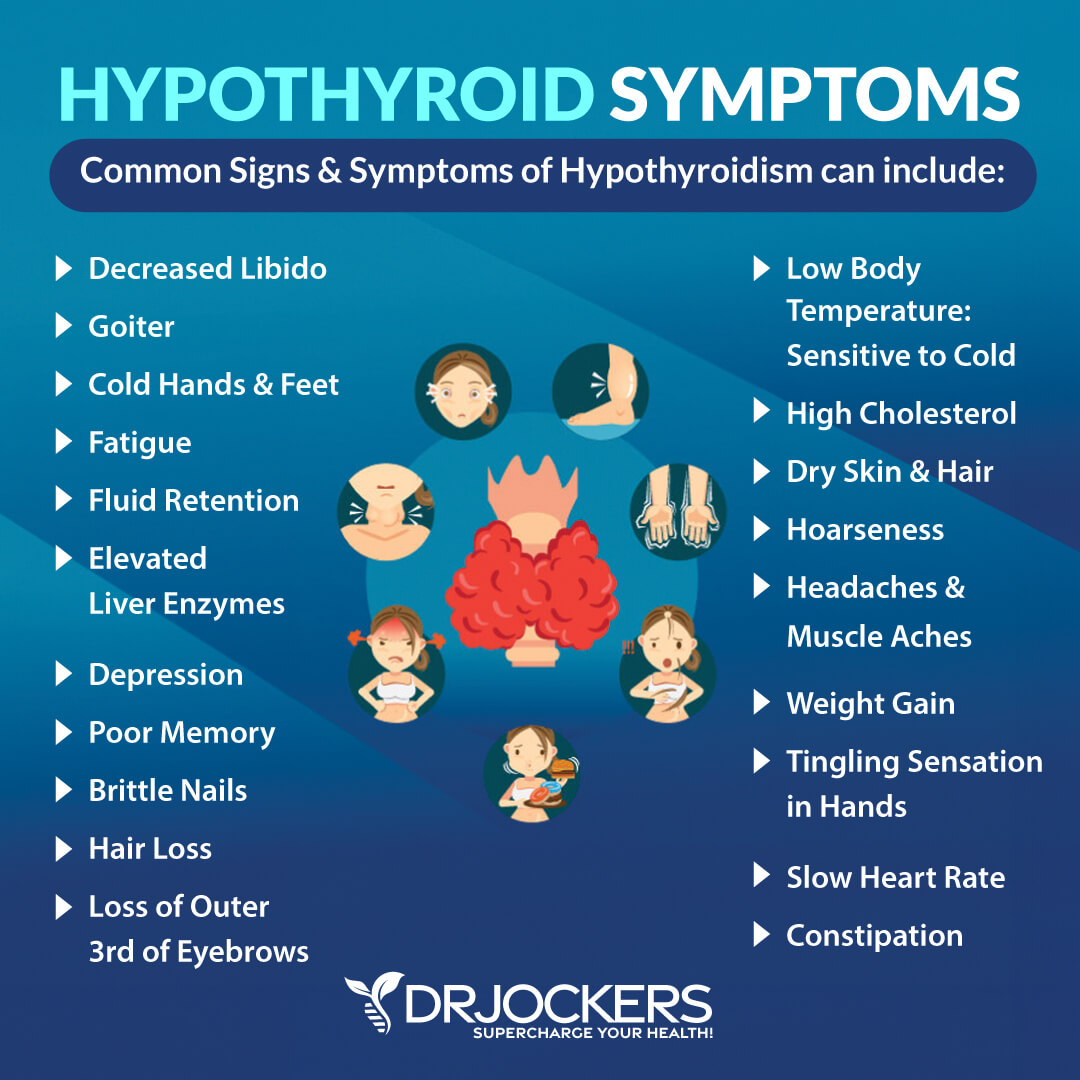
Low Libido
Low libido can, of course, occur in both men and women. In women, it can happen due to emotional and physical reasons, and it’s generally common during perimenopause and menopause.
Hormonal changes, lower testosterone levels, mental and emotional issues, societal attitudes towards aging, relationship issues, and hormonal problems, including polycystic ovarian syndrome (PCOS) and endometriosis, may all play a role in low libido in women (7, 8, 9).
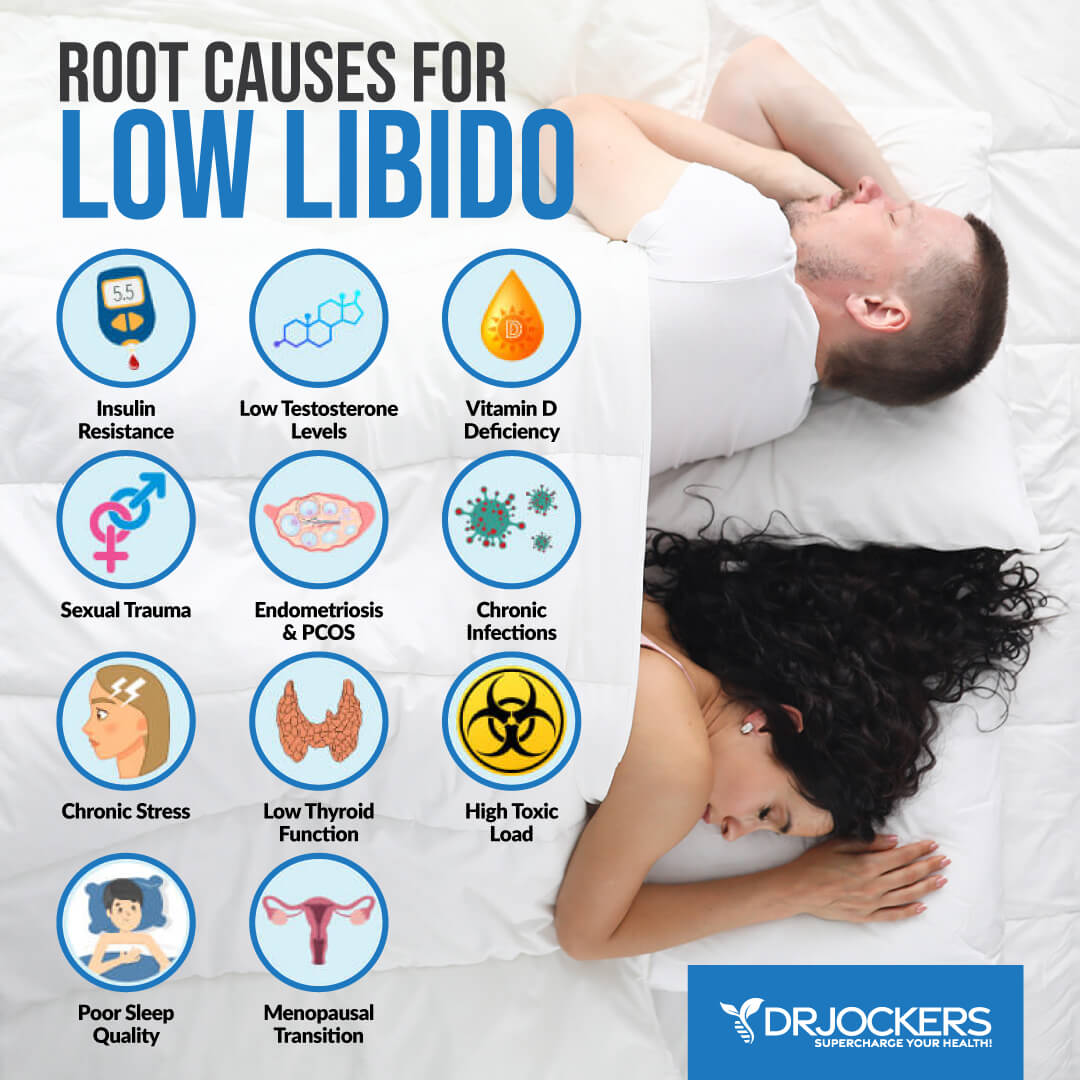
Fatigue
Fatigue is another common health concern women may develop due to physical, emotional, environmental, and lifestyle factors. Fatigue and trouble sleeping can happen at any time, but are increasingly common complaints in women during the perimenopausal and menopausal transition.
Low thyroid function or thyroid autoimmunity (Hashimoto’s thyroiditis) can be a big factor for women experiencing fatigue. Additionally, low testosterone levels, poor mitochondrial function, and circadian rhythm dysfunction from poor quality sleep can be a big factor.
Hormonal fluctuations, reduced levels of progesterone, vasomotor symptoms, ovarian hormone changes, restless legs syndrome, periodic leg movement syndrome, and obstructive sleep apnea can decrease the ability to relax, affect the brain, and interfere with sleep (10).
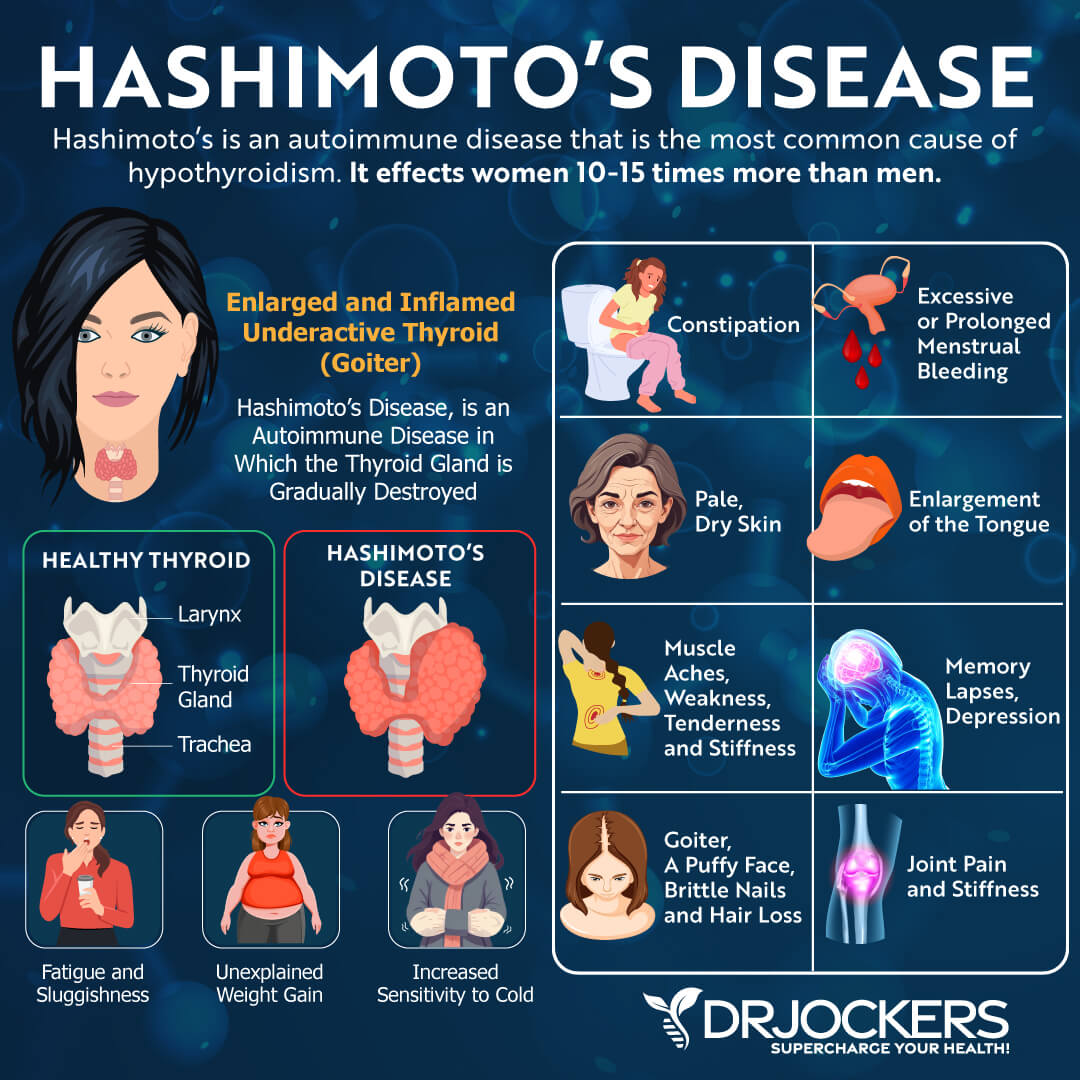
Osteoporosis
Osteoporosis is a disease that causes thin, weak, and fragile bones that can fracture easily, usually in the hip, spine, and wrist. It is a common issue, particularly in post-menopausal women.
Though poor nutrition, smoking, hyperthyroidism, certain medications, eating disorders, certain chronic health issues, and other factors can all increase the risk of osteoporosis, low estrogen, and menopause are among the top risk factors. Menopausal hormonal therapy is a common strategy to reduce your risk factors (11, 12).
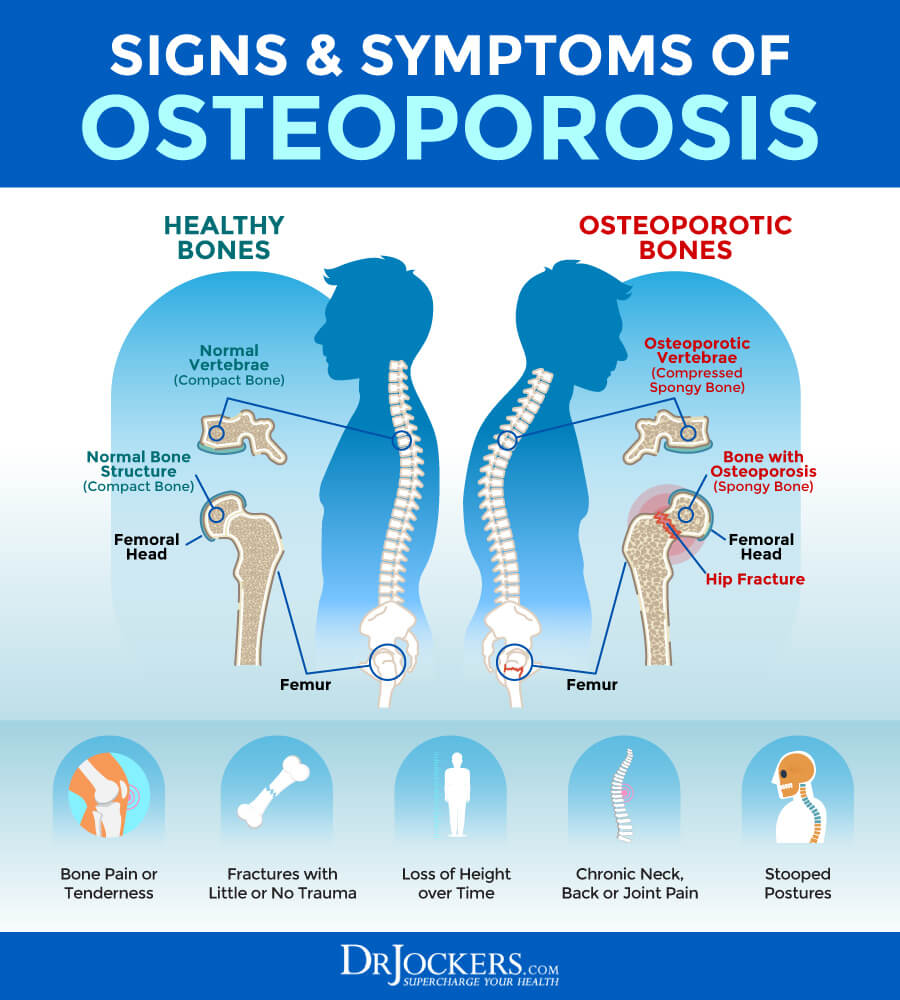
Hair Thinning
Finally, hair thinning is a common concern that many women struggle with. It is very common during hormonal shifts, including pregnancy, post-pregnancy, perimenopause, and menopause.
Stress and the lack of certain nutrients, including the lack of amino acids, vitamins, including vitamins C and A, and B vitamins, and minerals, including zinc, magnesium, calcium, iron, copper, selenium, and silicon, may all increase the risk of hair thinning (13).
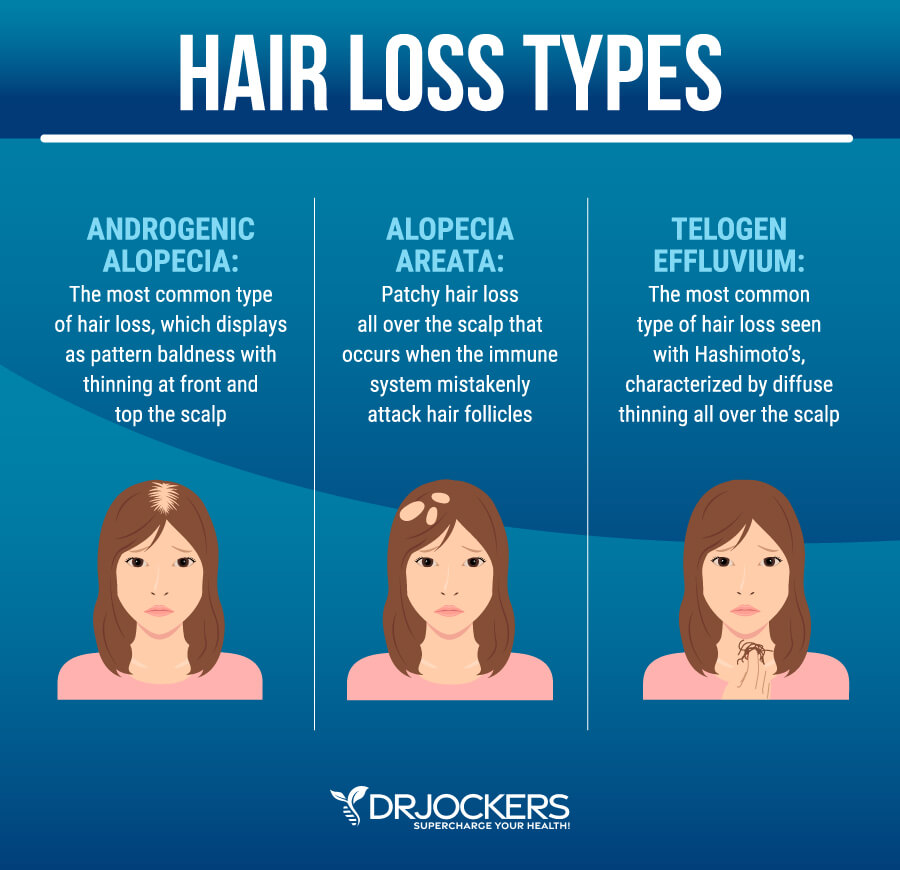
Major Root Cause Factors of Women’s Health Concerns
Understanding the major underlying factors behind women’s health issues is critical for finding natural solutions, including the right supplementation. I have explained the major root cause factors behind the most common women’s health concerns in this article in detail.
I recommend that you read this article. Here is a quick recap of the major root cause factors behind women’s health concerns:
- Insulin resistance & dysglycemia (5, 14, 15, 16).
- Chronic stress & poor sleep (10, 17, 18, 19, 20).
- Inflammation & autoimmunity (21, 22, 23).
- Gut dysbiosis & low stomach acid levels (25, 26, 27)
- Chronic infections, including Epstein Barr Virus (EBV) and Lyme disease (28, 29, 30, 31, 32, 33, 34, 35)
- High toxin exposure (36, 37, 38, 39, 40, 41)
- Sluggish liver function (42, 43, 44).
- Nutrient deficiencies, including deficiencies in zinc, B vitamins, iron, vitamin D, and magnesium (13, 45, 46, 47).
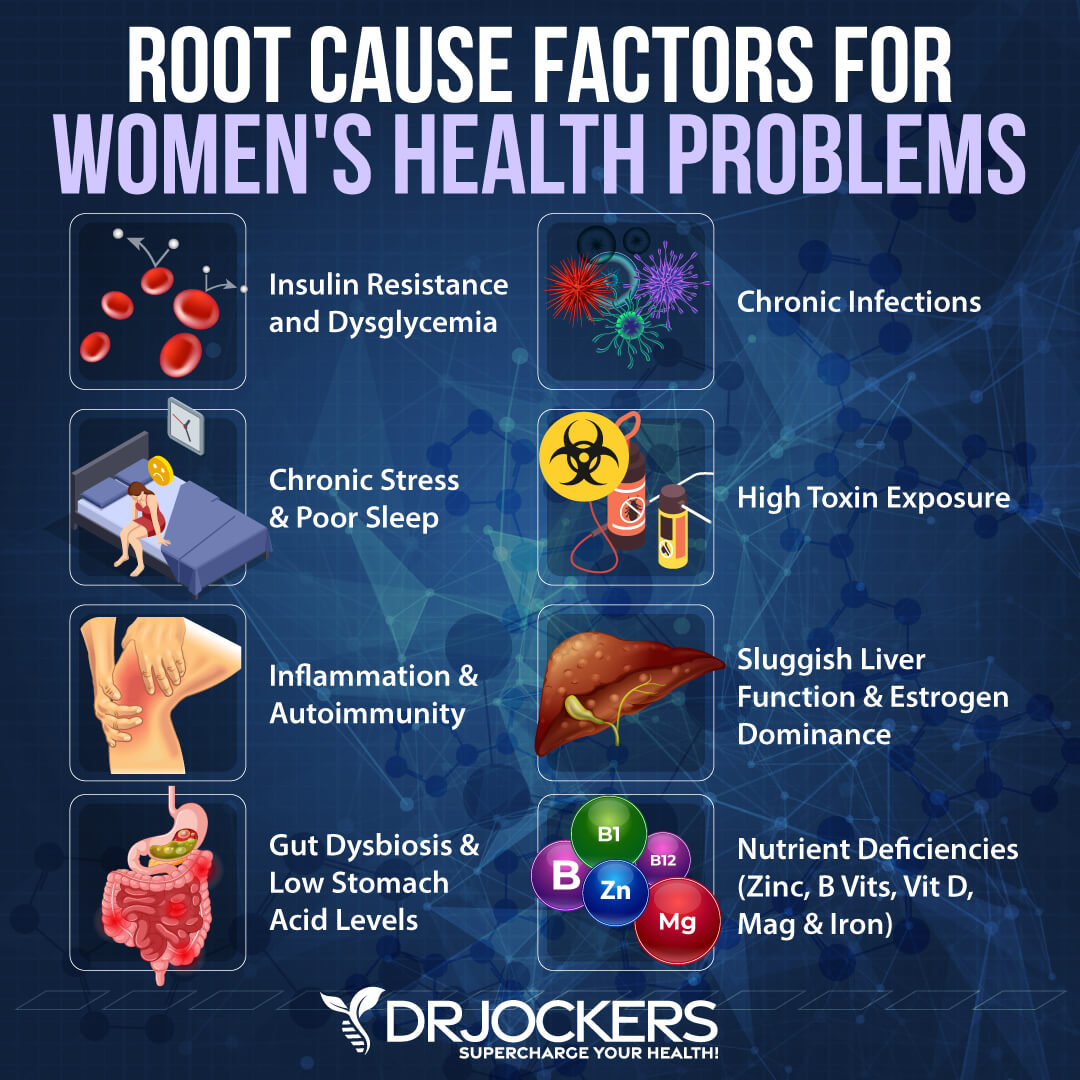
Healthy Lifestyle is the Foundation for Women’s Health
A healthy lifestyle is the foundation for women’s health — frankly, it is the foundation for anyone’s health. As you can see, many common women’s health concerns are related to chronic inflammation, poor sleep, chronic stress, poor gut health, blood sugar imbalances, environmental toxin exposure, and nutrient deficiencies.
These are all factors that you can reduce through healthy dietary and lifestyle choices, and as a result, you may reduce your risk or symptoms of common women’s health concerns. So what healthy lifestyle choices am I talking about here as a base for women’s health?
Again, I discussed my top recommendations in this article in detail. I recommend that you check this out. In short, I’m talking about diet, sleep, low stress, exercise, and other basics.
Eat a Healthy Real Food Diet
Improving your diet and following an anti-inflammatory, nutrient-dense nutrition plan can reduce your risks and improve your health (48). I recommend that you remove inflammatory foods, including refined sugar, refined oils, artificial ingredients, additives, junk food, and highly processed foods.
Choose organic whenever possible. Eat an anti-inflammatory diet rich in greens, vegetables, sprouts, herbs, spices, nuts, seeds, low-glycemic index fruits, grass-fed beef and butter, pasture-raised poultry and eggs, wild-caught fish and seafood, and wild game. Additionally, practicing intermittent fasting and reducing your carbohydrate load may also benefit women’s health (49).
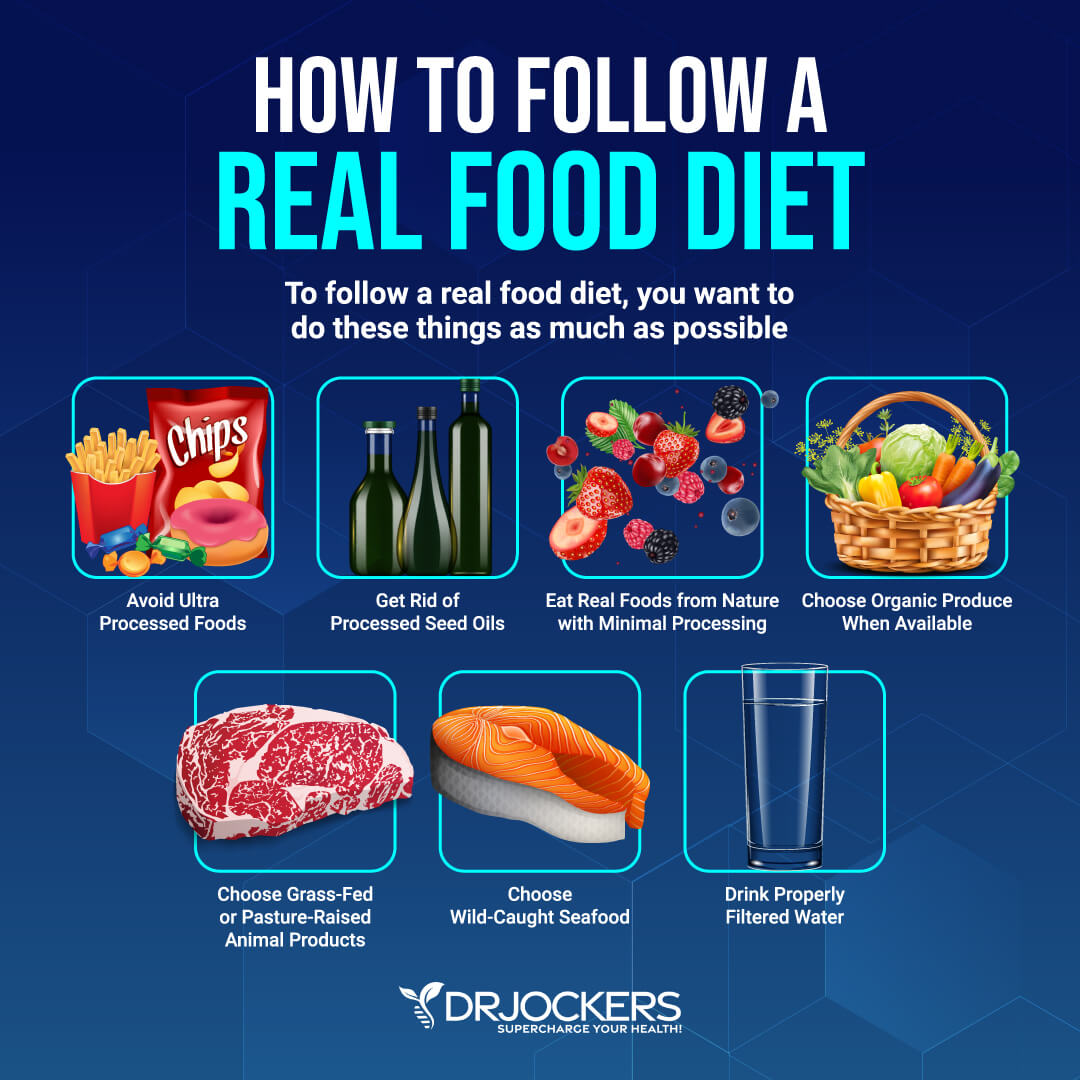
Prioritizing Restorative Sleep
Prioritizing sleep and reducing stress are also key; they can reduce chronic inflammation, support immune health, lower the risk of hormonal imbalances, and support your overall health (10, 17, 18, 19, 20). Aim for 7 to 9 hours of restorative sleep a night.
Practice meditation, breathwork, relaxation strategies, gratitude, and journaling. Spend time in nature, engage in activities you enjoy, and spend time with supportive friends, family, and community. Prayer or other spiritual practices can also help. If you need to, seek support from a therapist, life coach, or spiritual counselor.

Regular Movement and Exercise
Regular movement and exercise are also important for a healthy lifestyle (50, 51). Move your body throughout the day and exercise at least 20 to 30 minutes 5 days a week. I recommend a combination of cardio and strength training.
Strength and resistance training is particularly important and a non-negotiable for women in perimenopause, menopause, or post-menopause to protect their muscle health and bone health.
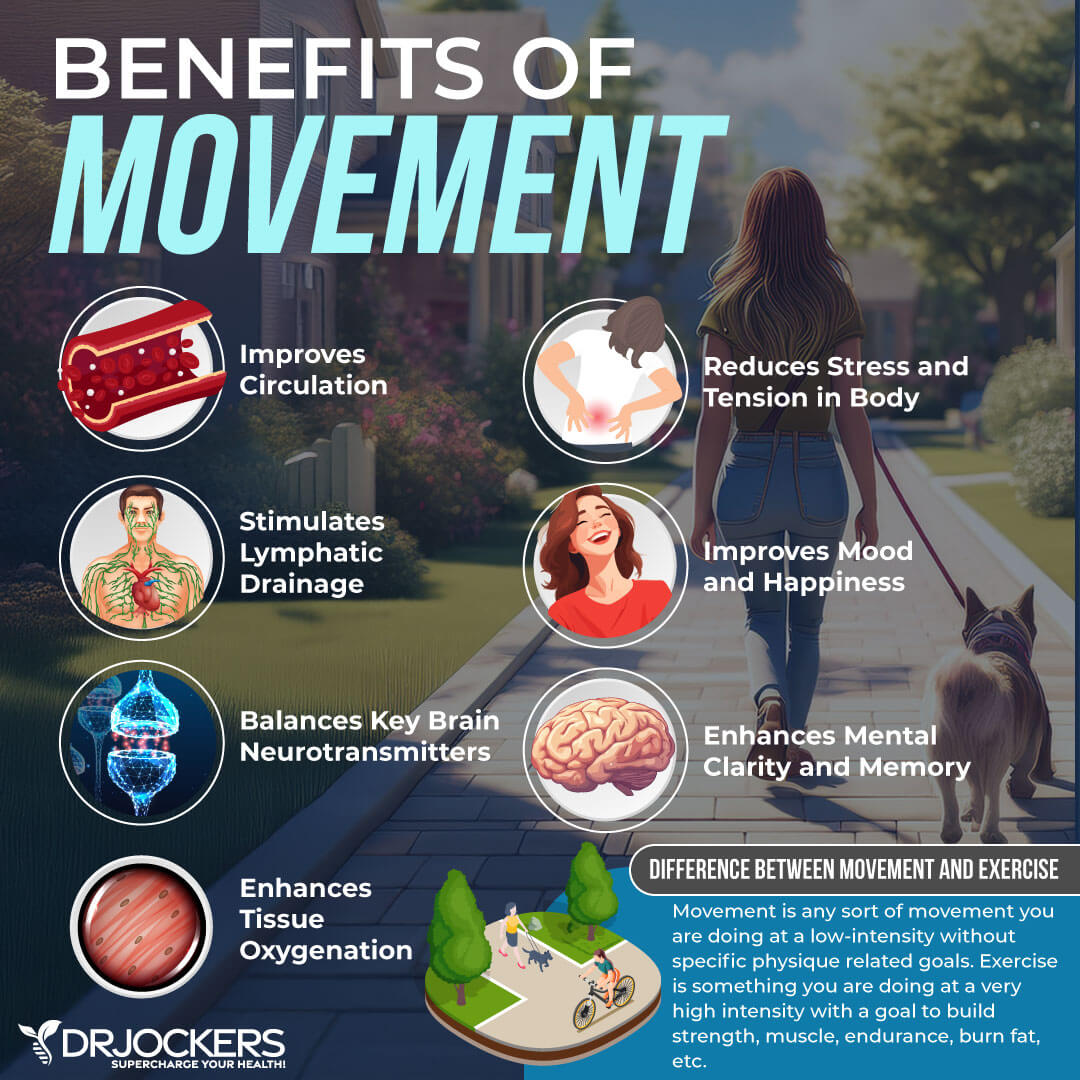
Support Detoxification and Gut Health
Supporting your detoxification pathways, reducing your parasitic, viral, and environmental toxin load is incredibly critical for lowering chronic inflammation, hormonal imbalances, and chronic women’s health issues (28, 29, 30, 31, 32, 33, 34, 35, 37, 38, 39, 40, 41).
So is supporting your gut microbiome and gut health, improving stomach acid levels (25, 26, 27). Finally, correcting nutritional imbalances and supporting your hormonal health through healthy nutrition and supplementation is essential for women’s health (13, 45, 13, 46, 47, 6, 52).
Again, you can learn about these dietary and lifestyle strategies for women’s health in this article and in other articles on my website in detail. Now, I want to focus on 10 specific supplements I recommend for female health.
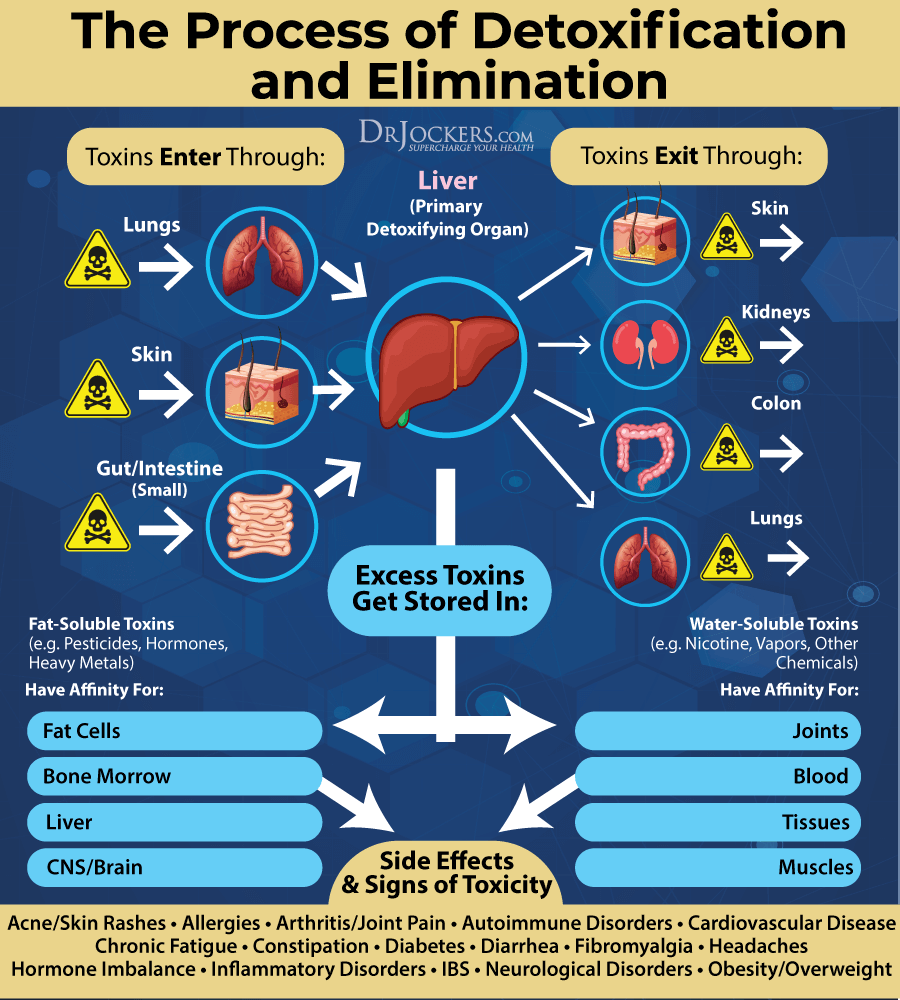
Top 10 Supplements for Women’s Health Concerns
I want to discuss the top supplements for women and how they play a role in female health, including energy, immune function, hormone health, liver health, and more.
You will learn about the mechanisms of how each of the nutrients benefits women, supported by studies. Let’s get into it.
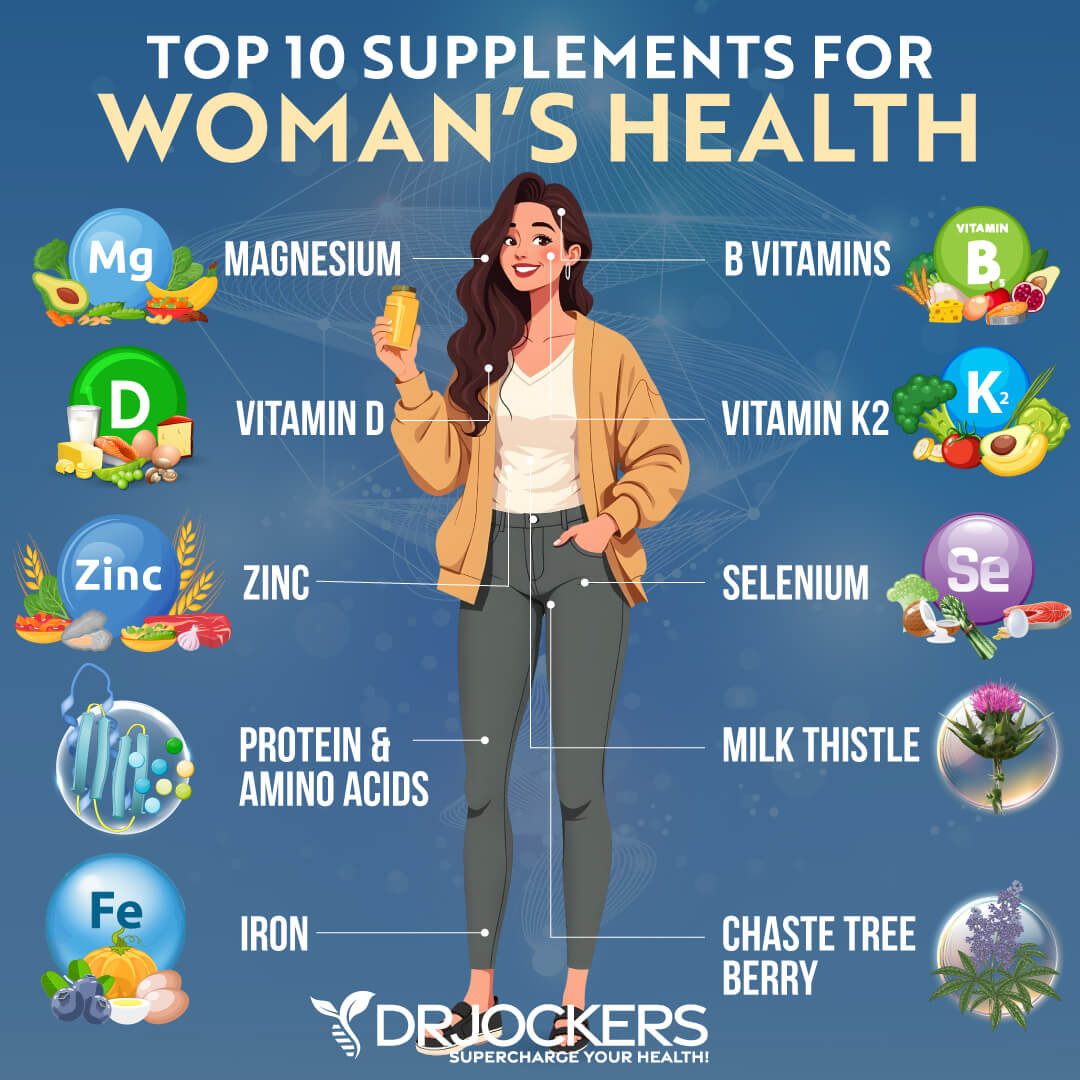
Magnesium
Magnesium is absolutely essential for the maintenance of normal cell and organ function. It is necessary for bone health, muscle health, relaxation, sleep, and more.
According to a 2021 article published in the JFS Journal, magnesium may play a role in many common women’s health concerns, including PMS, perimenopause, menopause, pregnancy, and PCOS (53).
Since magnesium levels can fluctuate during your cycle, low magnesium levels can occur and trigger PMS or other hormonal symptoms. It may help to reduce chronic inflammation and oxidative stress that may play a role in these issues.
According to the review, magnesium deficiency may play a role in insulin resistance and glucose imbalance, which has a role in PCOS and other hormonal women’s health concerns. A 2016 review published in Menopause Review found that poor nutrition, including poor magnesium levels, can all influence hair thinning in menopause (13).
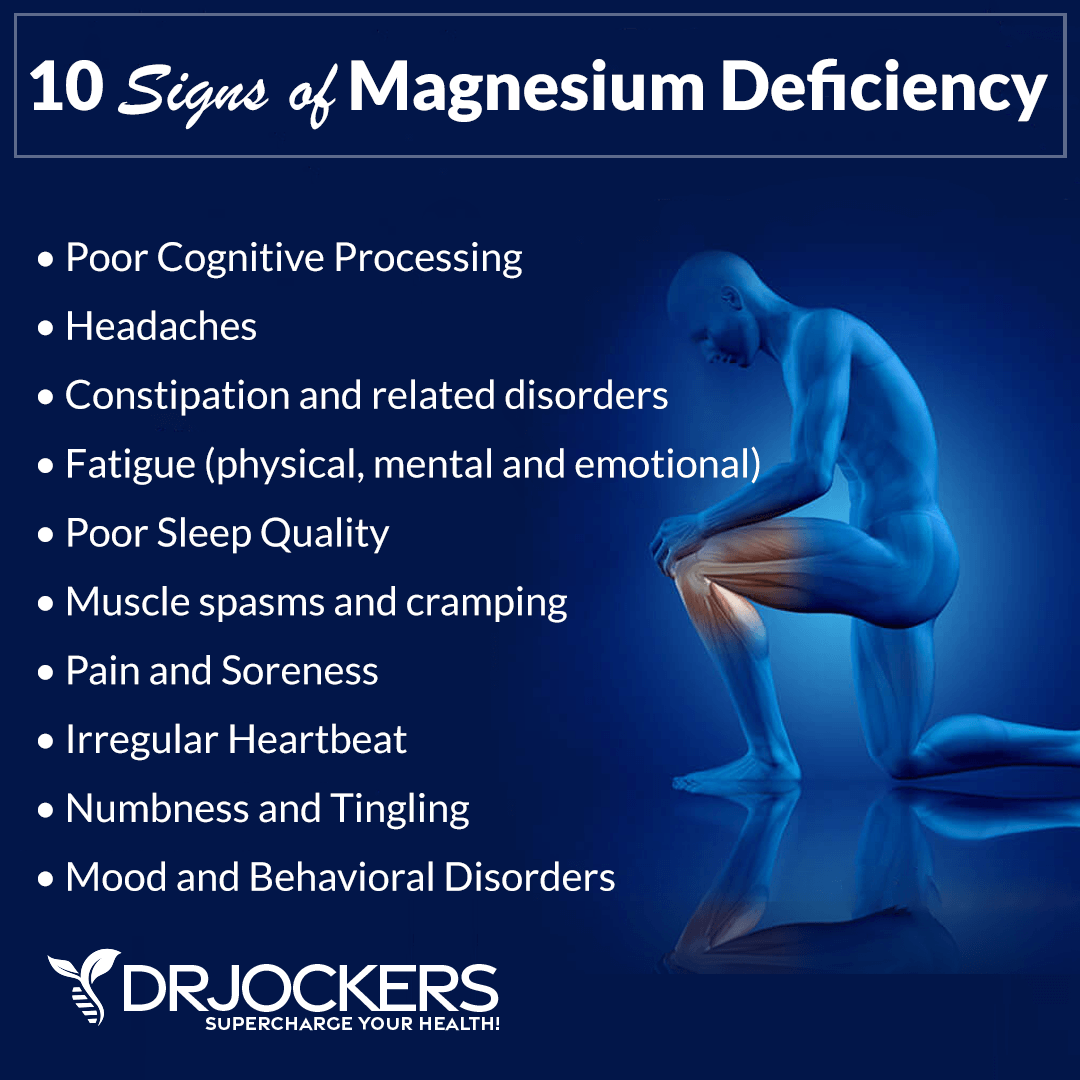
According to a 2016 study published in the Journal of Bone and Mineral Research, magnesium may also help to keep skeletal muscle mass and health in women, which is particularly important during and after perimenopause and menopause (54).
Magnesium is found in many foods, including pumpkin seeds, chia seeds, almonds, spinach, cashews, soy milk, black beans, edamame, peanut butter, potatoes with skin, brown rice, and plain yogurt.
However, due to our depleted soils, even these foods may have less magnesium than you should expect. Moreover, magnesium deficiency is a common issue; thus, magnesium supplementation may be beneficial for most individuals, especially those with women’s health concerns.
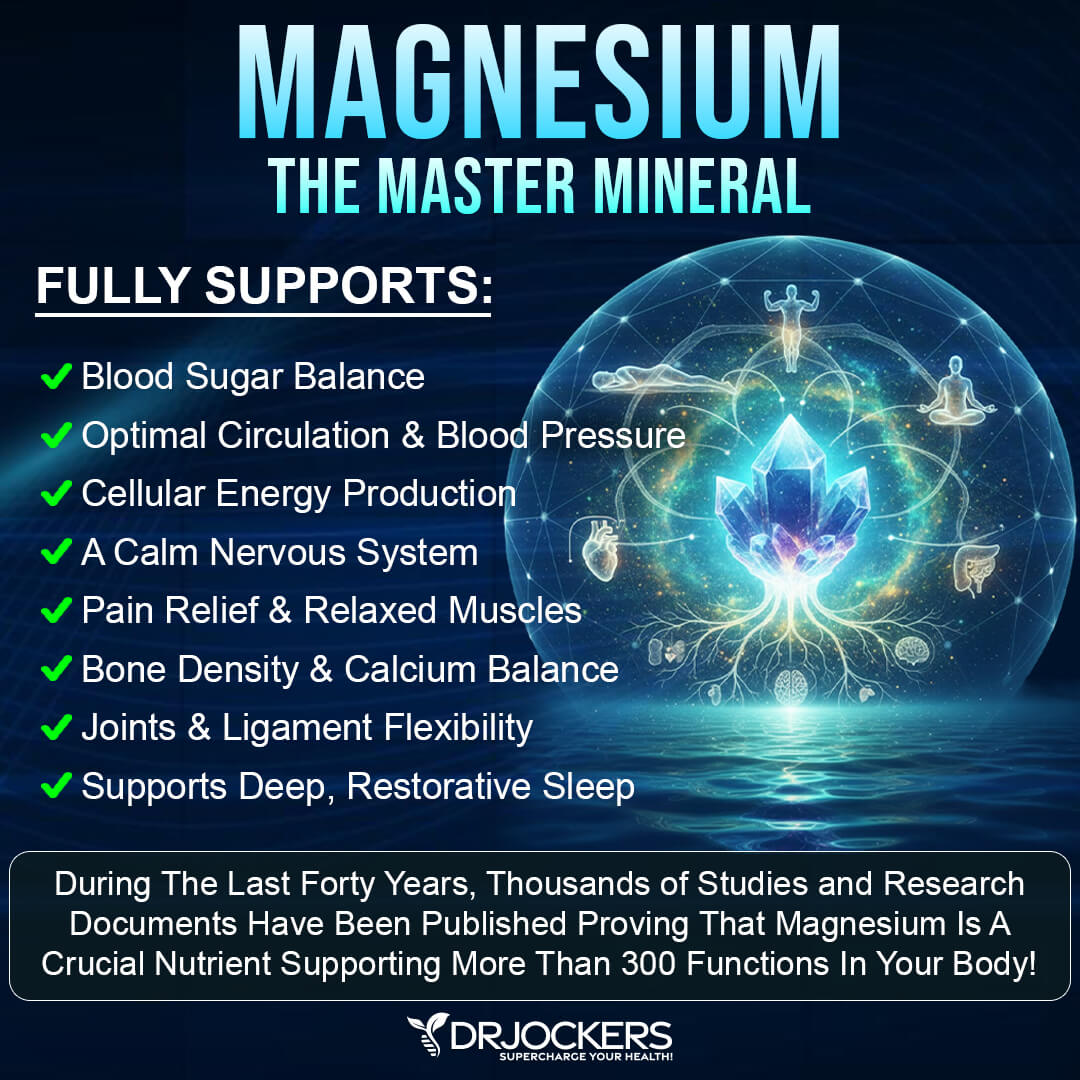
Vitamin D
Vitamin D is not just a vitamin. It is actually a hormone that communicates with your immune system. It helps to balance the hormones of your reproductive system and other hormones. Vitamin D helps regulate estrogen and progesterone activity and balance.
Thus, it plays a role in your menstrual cycle and ovarian function. According to a 2021 paper published in Frontiers in Endocrinology (Lausanne), vitamin D is critical for fertility in reproductive-aged women (55).
Low vitamin D levels may increase the risk of estrogen imbalance, parathyroid imbalance, pituitary imbalance, and testosterone imbalances, and related symptoms, including hot flashes, mood swings, fatigue, weight gain, hair loss, and more.
According to a 2016 study published in the European Journal of Obstetrics, Gynecology, and Reproductive Biology, vitamin D deficiency can lead to depression, low libido, lower chance of orgasm, and lower sexual satisfaction in young women (45).
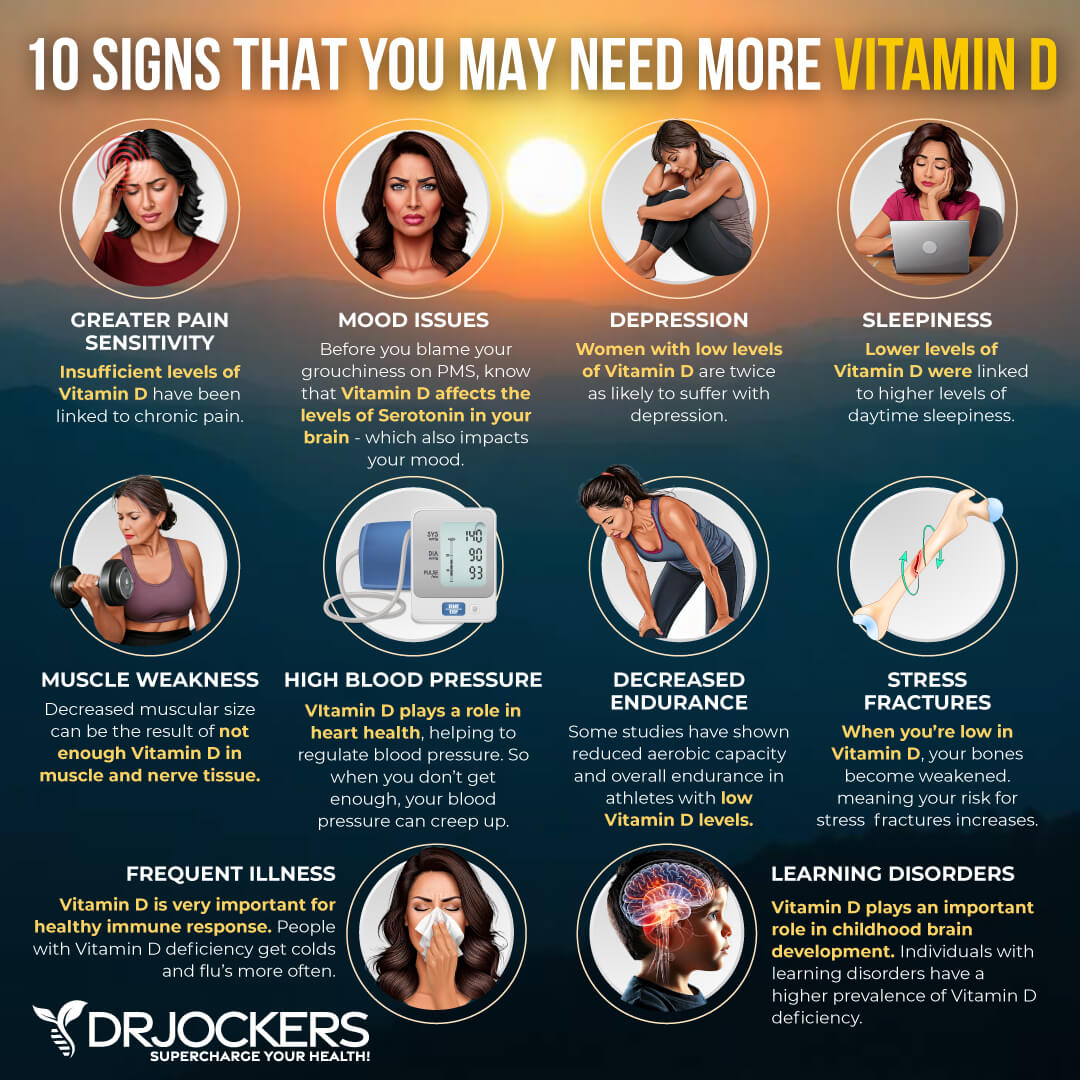
Zinc
Zinc is an essential mineral mainly known for its benefits for human health. It also helps to regulate hormones in women. Deficiencies may increase the risk of women’s health concerns. It plays a critical role in ovulation, menstrual cycle regulation, egg maturation, and other important areas of reproduction.
It plays a critical role in progesterone and testosterone production, which means that low levels may increase the risk of fertility issues and problems with libido. Besides the reproductive system, zinc also plays a role in other hormonal production, secretion, and function in the thyroid and pancreas.
According to a 2020 review published in Nutrients, poor zinc levels can play a role in female reproductive system disorders, including polycystic ovary syndrome (PCOS), dysmenorrhea, or endometriosis (56).
Since poor zinc levels may increase the risk of women’s health concerns, improving zinc levels may help to reduce your risk or improve symptoms associated with these women’s health conditions. According to a 2020 animal study published in the Iranian Journal of Basic Medical Science, zinc may help to improve reproductive hormone balance, insulin resistance, and mTOR expression in PCOS (57).
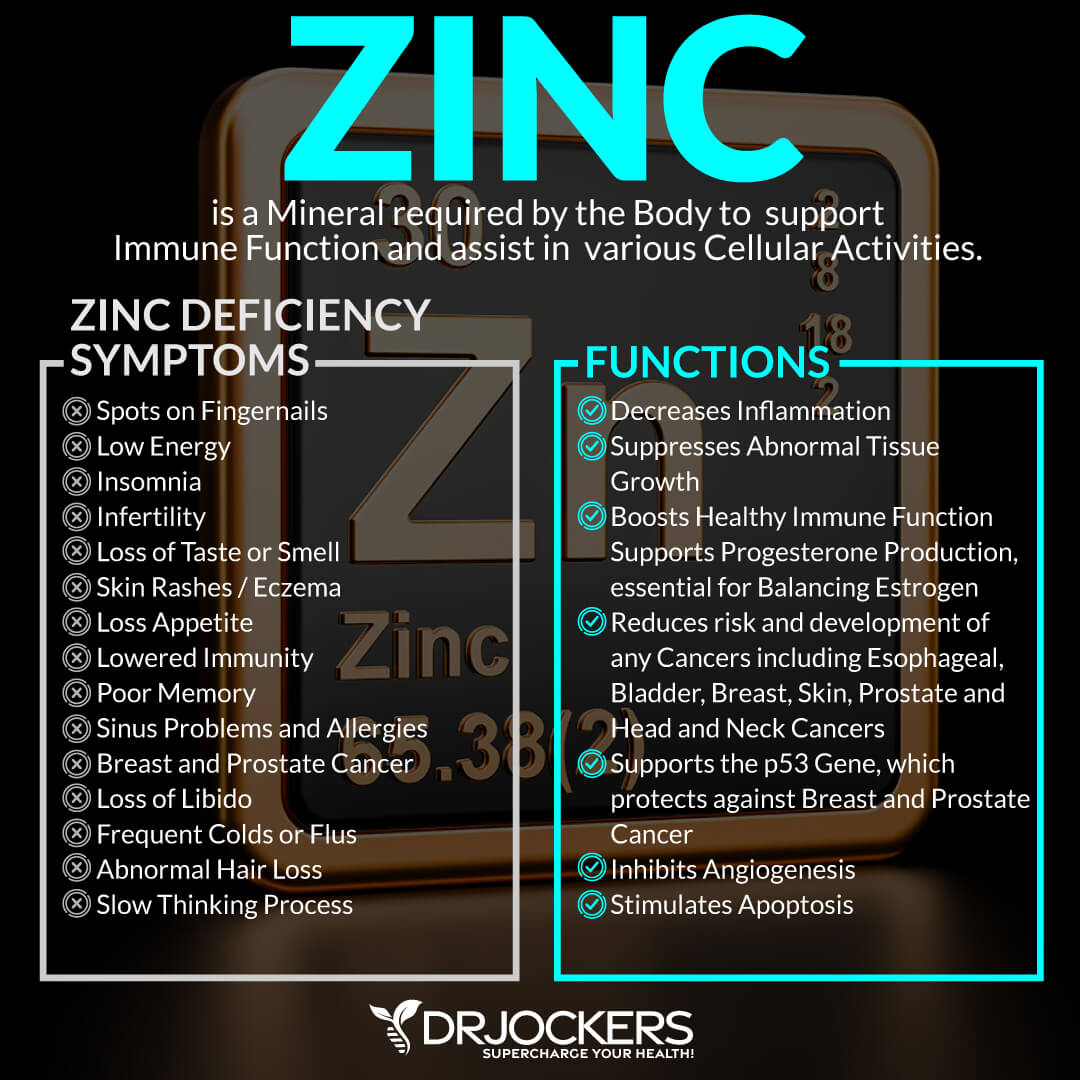
Protein and Amino Acids
Protein and amino acids are incredibly important for women’s health. They are essential for muscle strength and muscle health. Perimenopause and menopause result in muscle loss, which may lead to all kinds of health issues, including injuries, fragile bones, and loss of energy.
Moreover, proteins are made of amino acids, which make peptide hormones. Peptide hormones are protein-derived hormones that play a role in growth, energy metabolism, reproduction, appetite, stress, and mood. Amino acids also play a role in embryo development, particularly during peri-implantation.
Supporting protein and amino acid levels is not only important for improving muscle strength and health, but also for other areas of hormonal health. This is particularly important during perimenopause and menopause, even for the most surprising reasons. For example, according to a 2021 study published in Dermatology and Therapy, amino acids may help to reduce age-related skin changes (58).

Iron
Iron is particularly important for menstruating women. It helps to regulate the menstrual cycle and hormone production. Blood loss during your period can increase the risk of iron loss and iron deficiency, and related iron-deficiency anemia and fatigue.
Women with heavy periods, more frequent or longer than normal periods, are at higher risk of iron deficiency. Perimenopausal women also commonly experience anemia due to their changing cycle and hormone levels.
A 2011 study published in the Journal of the American Dietary Association found that nutrient deficiencies, including deficiencies in iron, vitamin B12, and folate, can increase the risk of anemia in postmenopausal women (46). A 2016 review published in Menopause Review has found that poor nutrition, especially the lack of certain nutrients, including iron, can influence hair thinning in menopause (13).
Paying attention to their iron levels is critical for all menstruating females, especially those with hormonal issues and heavy or abnormal periods, as well as athletes and those with eating disorders.
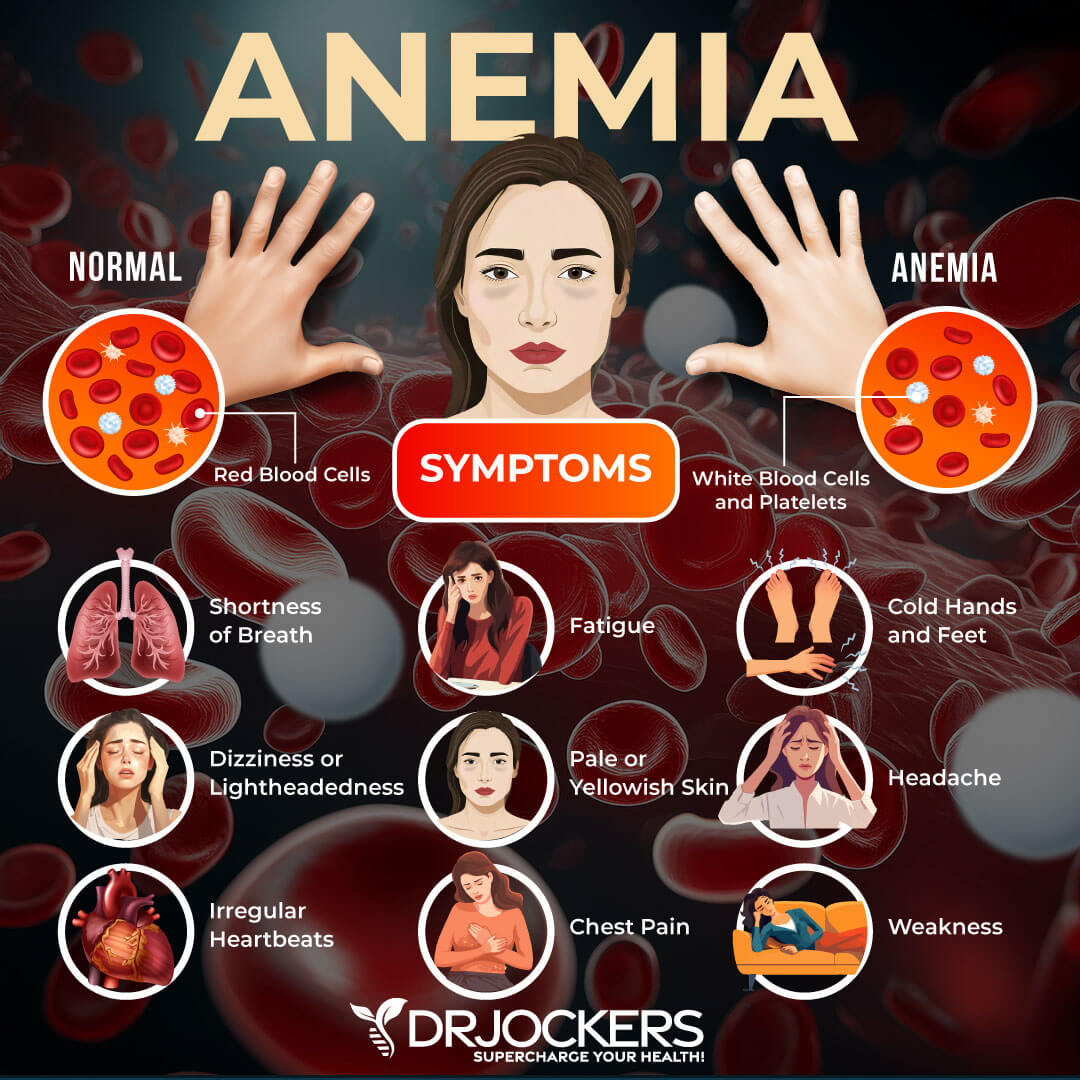
B Vitamins
B vitamins are incredibly important for hormone production. Women who are on birth control are at a higher risk of depleted B vitamin levels. Coupled with a diet low in vitamin B, it’s not good news. Hormonal changes during perimenopause and menopause may also increase the risk of low vitamin B levels.
According to a 2020 article published in the Journal of the Academy of Nutrition and Dietetics, vitamin B2, B6, and B12 levels can affect the ovarian cycle during perimenopause (59).
A 2011 study published in the Journal of the American Dietary Association has found that nutrient deficiencies, including deficiencies in iron, vitamin B12, and folate, can increase the risk of anemia in postmenopausal women (46). A 2016 review published in Menopause Review found that vitamin B deficiency is among the nutrient issues that can influence hair thinning in menopause (13).
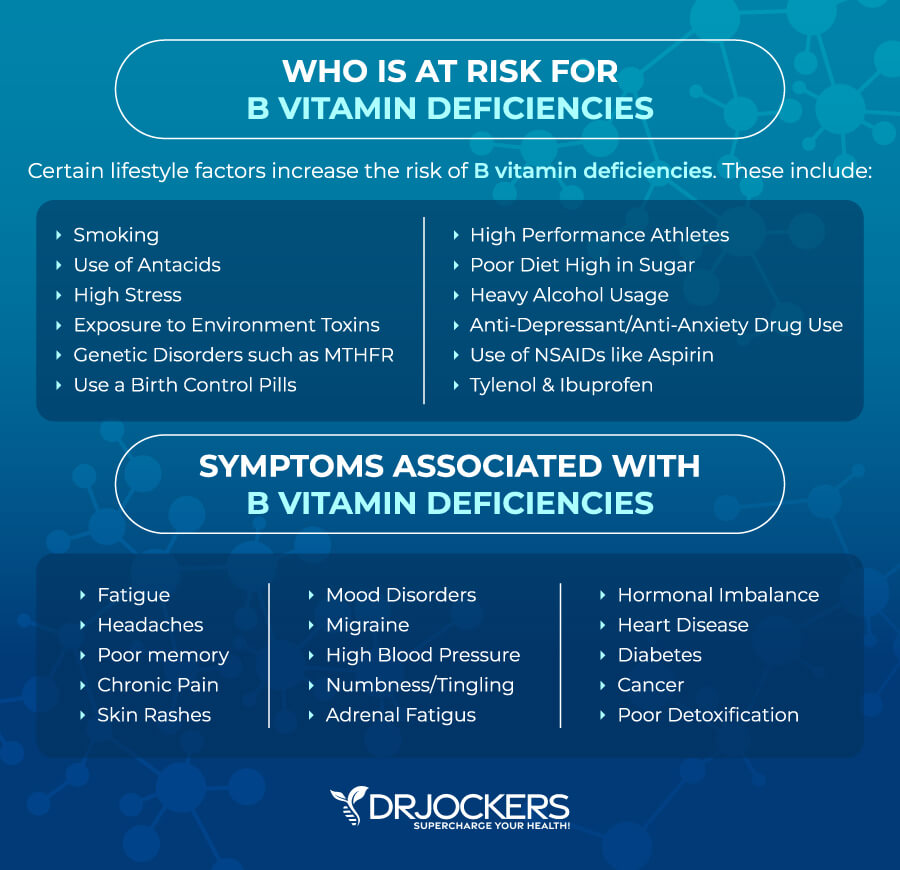
Vitamin K2
Vitamin K2 is essential for vitamin D action. It helps vitamin D to allow calcium absorption and processing. This is especially important during perimenopause and menopause, as bone density can decline.
It may help to reduce the risk of osteoporosis and fractures. According to a 2022 review published in Frontiers in Public Health, vitamin K2 may help to reduce the risk and support the treatment of osteoporosis after menopause (60).
However, vitamin K2 has some other important benefits for women’s health. It has a critical role in estrogen metabolism and reduces the risk of bone loss related to low estrogen.
It may support hormonal balance and fertility, including testosterone levels and sperm production. It may be helpful for women with endometriosis, PCOS, menstrual pain, and other hormonal issues.
Improving vitamin K2 levels may help with these issues. For example, according to a 2022 study published in Advanced Nutrition, vitamin K2 is among the potential complementary therapies for PCOS (61).
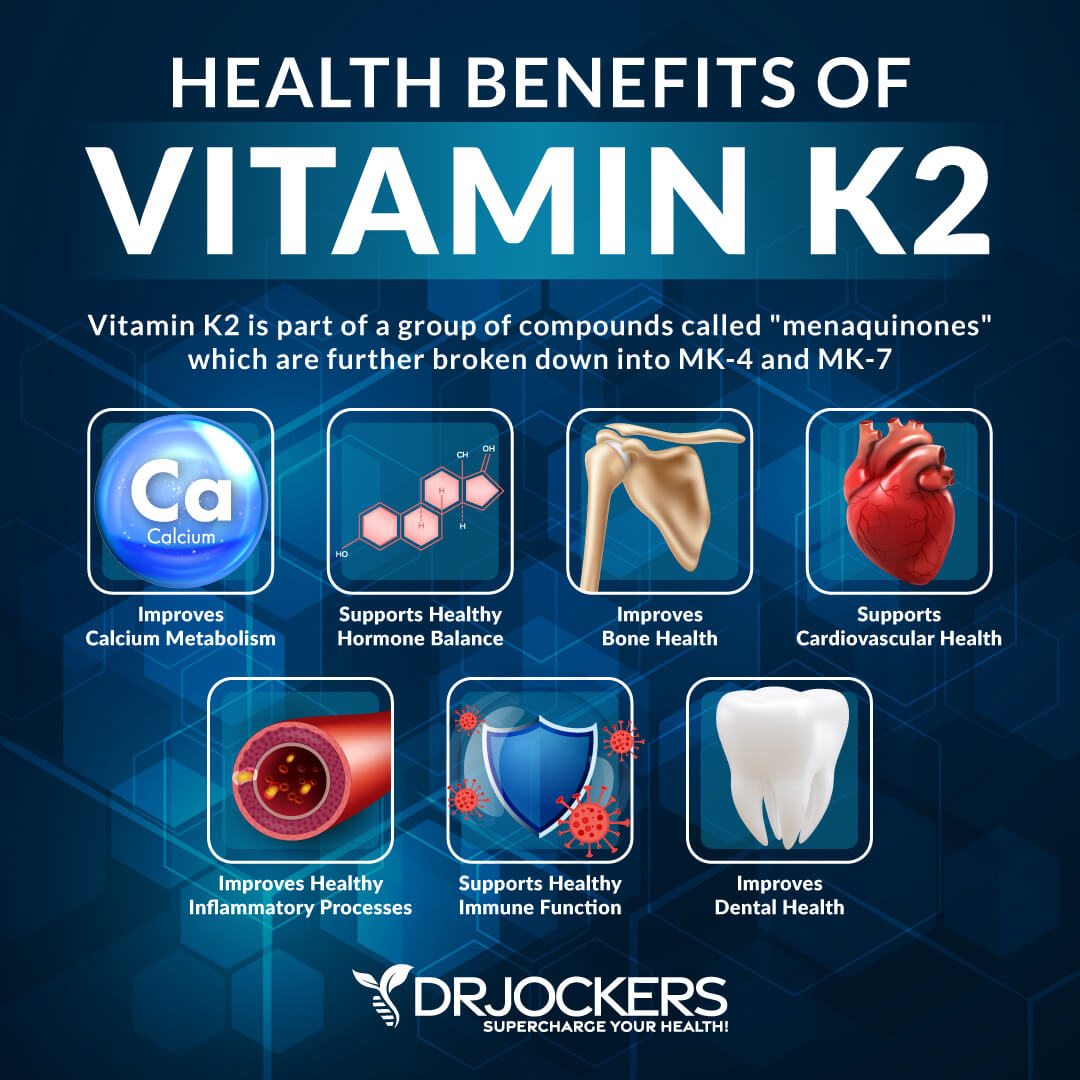
Selenium
According to a 2022 review published in the International Journal of Molecular Sciences, selenium is important for overall bodily homeostasis, including hormonal health (62). It is another mineral that plays a critical role in women’s hormonal health. It helps with a regular menstrual cycle, especially in the follicular phase, ovulation, and menstruation, but also in the luteal phase.
It is critical for overall hormone balance and supports fertility and a healthy pregnancy. During pregnancy, selenium can support antioxidant activity, allow the production of progesterone, estradiol, and T4, improve nutrient metabolism, and support fetal development.
According to a 2022 article published in Revista Brasileira de Ginecologica e Obstrectica, selenium can play a role in infertility issues, and improving levels may support fertility and pregnancy (63). Moreover, it’s also critical for metabolism and thyroid health, which are related to other common women’s health concerns.
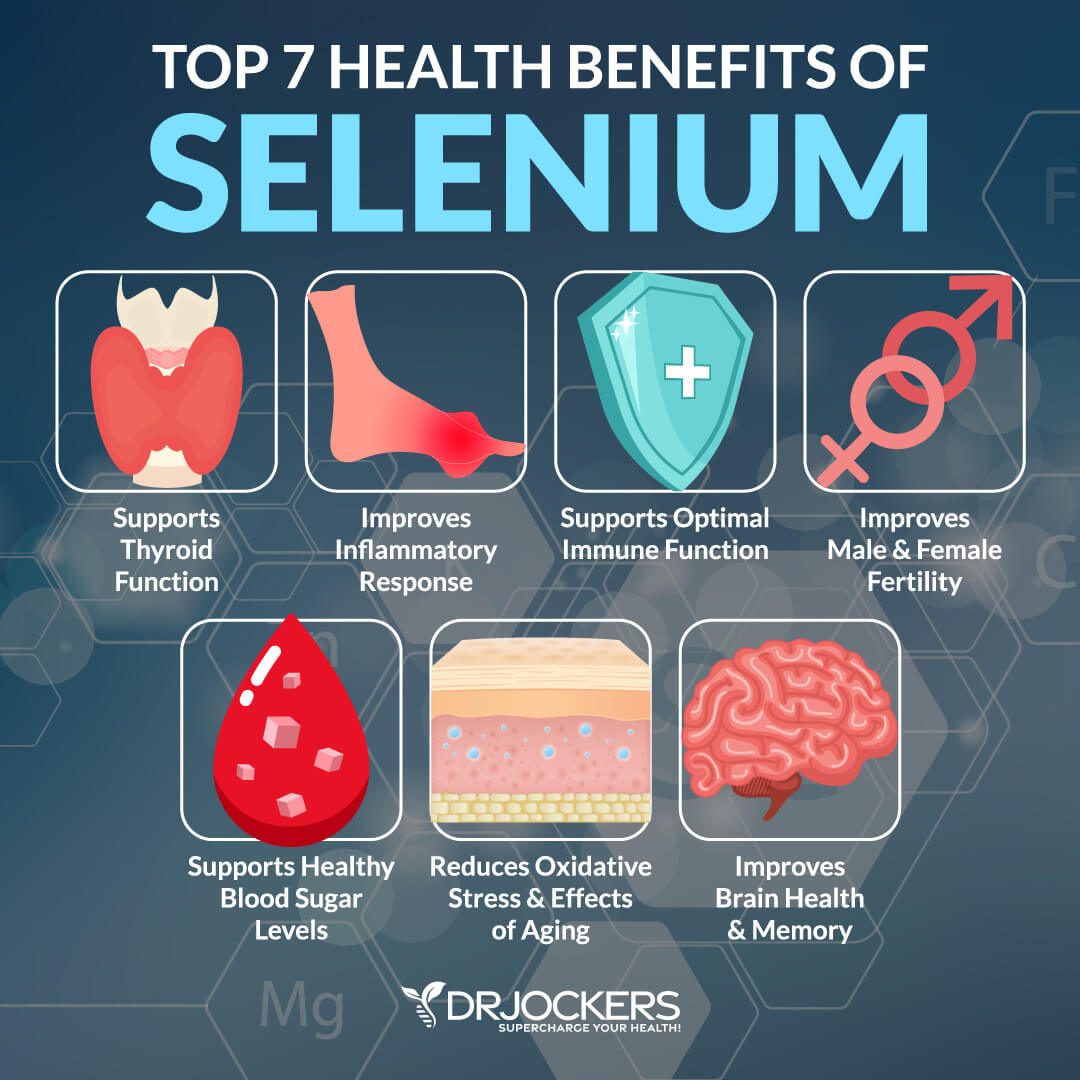
Milk Thistle
Milk thistle is a flowering herb commonly taken for indigestion, jaundice, liver health, and other issues. Since it supports liver health, it can also help clear xenoestrogen chemicals from your body.
Xenoestrogens mimic estrogen and can increase estrogen dominance and related symptoms and health issues. It may help with hormonal issues, including PMS, milk production, fertility, and menopause.
According to a 2020 study published in Phytotherapy Research, it may help to reduce menopausal symptoms (64). According to a 2016 paper published in Pharmacological Reviews, it may be among the herbs that can help PMS, menopause, pregnancy, and other hormonal women’s health concerns (65).
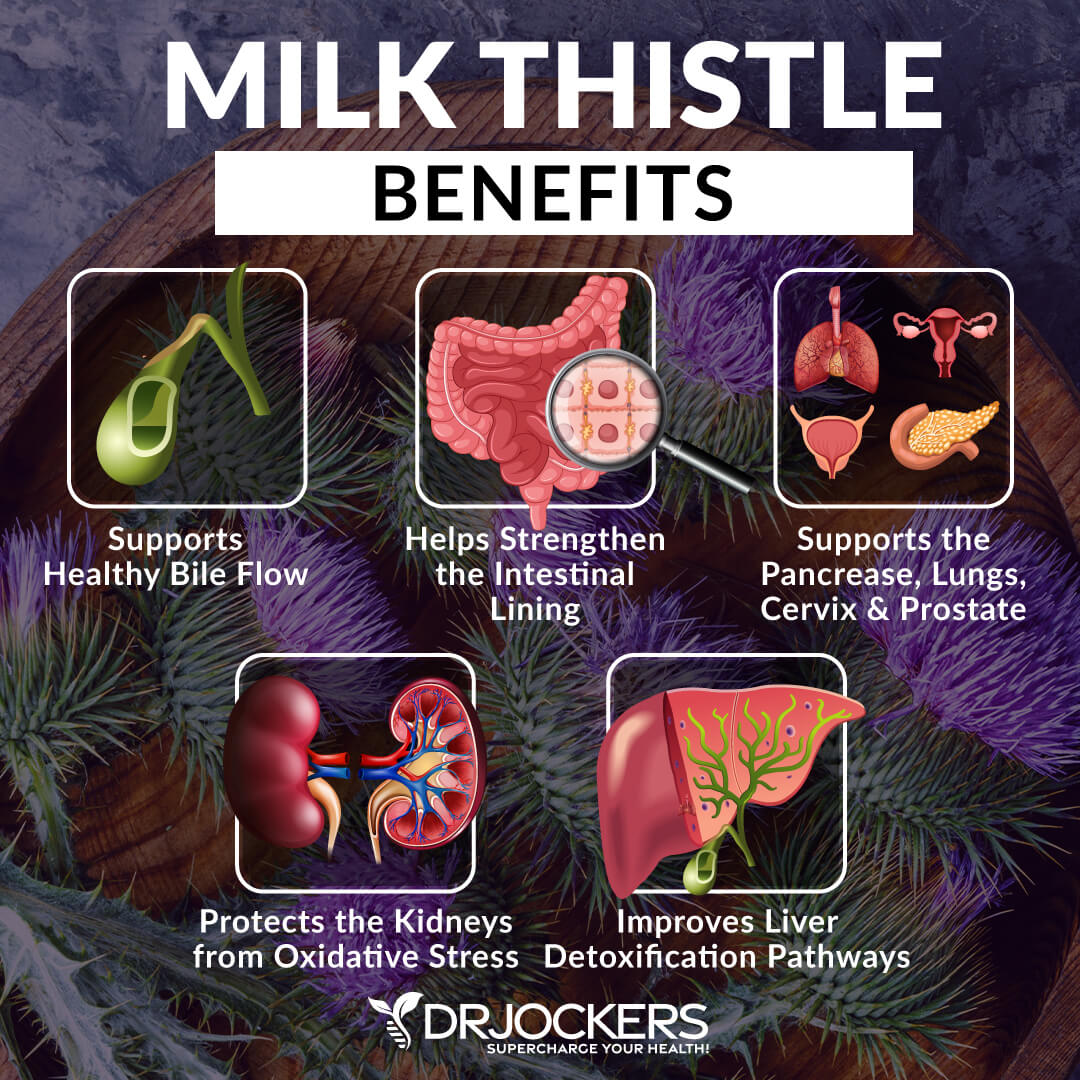
Chaste Tree Berry Extract
Chaste tree berry extract is a medicinal herb from the Mediterranean and western Asia. It is another herb that may be used to naturally support women’s hormonal health and fertility. It may help to balance hormones and reduce inflammation.
As a natural remedy, it is commonly used for PMS, breast pain, infertility, issues with the menstrual cycle, libido, and menopause (66). A 2013 review published in Planta Med suggests that chaste tree berry extract may be helpful for premenstrual syndrome, premenstrual dysphoric disorder, and latent hyperprolactinemia (67).
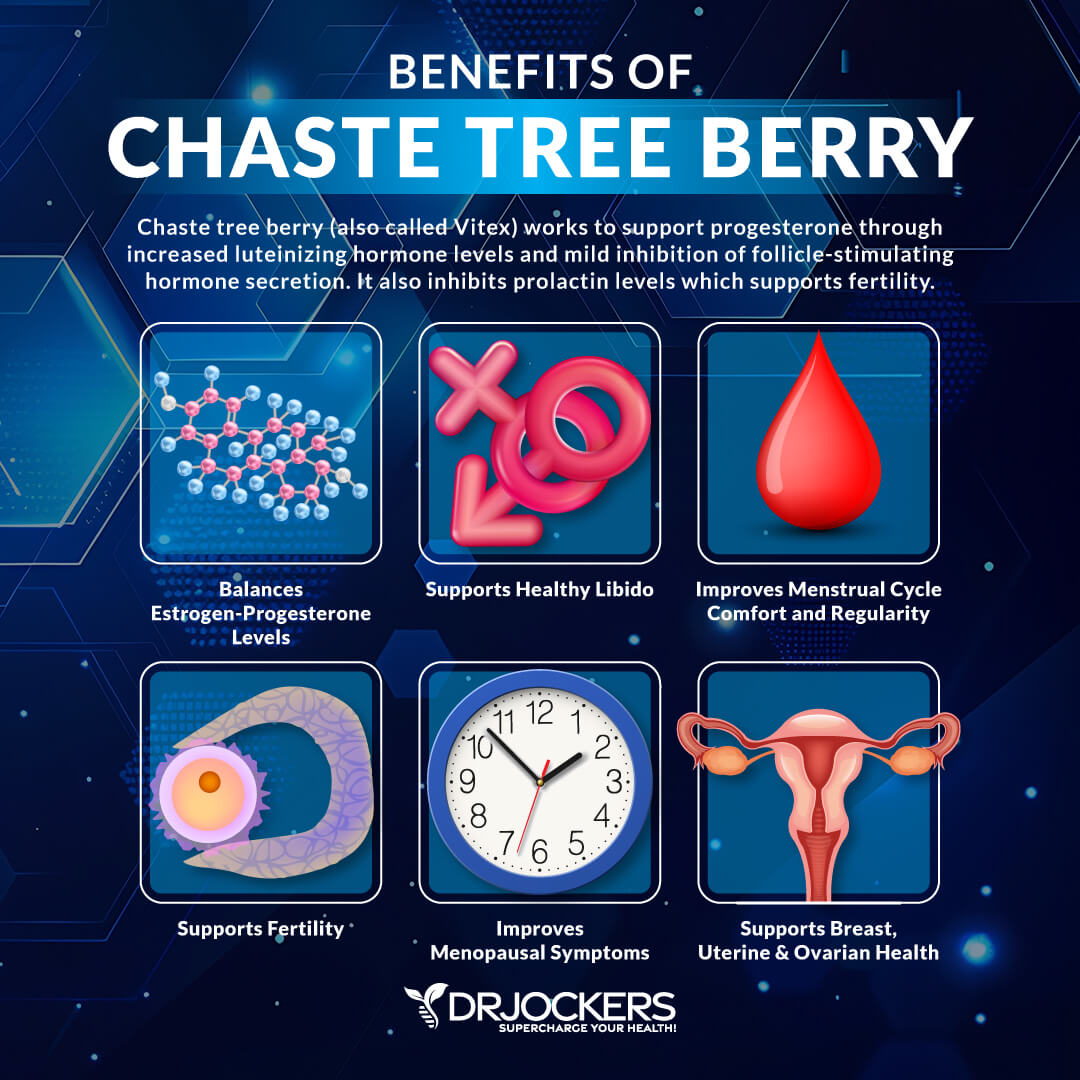
My Women’s Health Protocol
Now that you understand the top nutrients for women’s health, you must be wondering what the best supplements you could take to protect your health and reduce your risk of women’s health concerns.
Here is my women’s health protocol and specific supplements I recommend for women’s health concerns.
ImmunoCharge
The second product I recommend for women to support their immune health and reduce inflammation is ImmunoCharge. This supplement is designed to provide you with key nutrients and compounds to support your immune system.
The ingredients in this supplement support the body’s natural immune mechanism to help maintain good health. Rather than taking multiple different supplements to get these key nutrients, you can get what you need in ImmunoCharge.
The ingredients in this supplement include quercetin, zinc, vitamin D, N-Acetyl Cysteine (NAC), vitamin C, selenium, resveratrol, magnesium, vitamin A, and vitamin K2. These ingredients support the body’s natural immune mechanism to help maintain good health.
Rather than taking multiple different supplements to get these key nutrients, you can get the clinical dosages within 2 capsules daily of ImmunoCharge. I recommend taking 1 capsule twice daily with meals for optimal absorption, or as directed by your healthcare practitioner. For an advanced dose, I recommend 2 capsules twice a day.
Liver Support
Last but not least, I recommend liver-supporting supplements, such as Liver Support for women’s health. It is a blend of nutrients that have immune-supportive and antioxidant properties and help support a balanced inflammatory response.
This supplement protects the liver cells from oxidated stress and boosts glutathione to strengthen our immune system. It is a synergistic formula designed to support healthy liver function.
This synergistic blend of hepatoprotective nutrients includes the fungus Cordyceps sinensis and reishi mushroom, both of which have immune-supportive and antioxidant properties, and help to support a balanced inflammatory response.
It also contains N-acetylcysteine (NAC), which helps protect the body from oxidative stress and upregulates the formation of glutathione, the predominant antioxidant found in the liver.
The mushroom extracts and herbal ingredients in this product are designed to protect liver cells against oxidative damage which may affect the function of the liver. The ingredients also actively contribute to detoxification processes in the liver by supplying nutrients that may enhance the biochemical reactions involved in neutralizing harmful substances. I recommend that you take 4 capsules per day or as directed by your healthcare practitioner.
Bonus Products
In addition to these three supplements, I also recommend some bonus products to protect your health and support specific women’s health issues, depending on your needs. Here are my recommendations:
Brain Calm Magnesium
I recommend Brain Calm Magnesium. It supports a healthy immune system, and a calm nervous system, and increases bone density and joint flexibility. We developed Brain Calm Magnesium to provide the best form of magnesium to improve brain function and neuronal health.
This product helps you to focus, concentrate, and perform at a significantly higher level. In addition, it is fantastic for reducing anxiety, while improving mood, memory, and sleep.
Brain Calm Magnesium features key Albion forms of Magnesium (malate, lysinate & glycinate chelate) as well as magnesium L-threonate the only form of magnesium proven in animal studies to cross the blood-brain barrier. Boosting the brain’s magnesium level is vital to healthy cognition, which includes long- and short-term memory, learning, stress management, and sleep.
I use Brain Calm Magnesium daily, myself, during the daytime to improve my concentration and productivity. I also take some at night and have noticed much deeper and more restorative sleeping patterns. You can use this similarly during the day or at night, as you need it.
Thyroid Strong
For thyroid health, I recommend Thyroid Strong. Clinically, I use this product when I see that the patient is struggling to produce thyroid hormones. This can be indicated by an elevated thyroid stimulating hormone (TSH) or low T4 or T3.
Thyroid Strong is a comprehensive freeze-dried, BSE-free, bovine, multiglandular, mineral, and herbal formula to support healthy thyroid function. Thyroid Strong provides essential nutrients, and herbal and glandular support for the production of thyroid hormones.
If you are dealing with thyroid issues, I recommend 1 to 2 capsules first thing in the morning, away from food or as directed by your health care practitioner. For advanced dosage, use 3 to 4 capsules first thing in the morning, away from food or as directed by your health care practitioner.
Fem Protect
For hormonal support in women, Fem Protect is a fantastic product I highly recommend. It is a fantastic product to help support women who are struggling with menstrual cramping, PMS, excessive bleeding, abnormally missed menstrual cycles, or infertility. It can also be a great support for women during the perimenopause and menopausal transition.
Fem Protect™ supports classic herbal hormonal balancing in the form of vitex, polygonum, and black cohosh, along with DIM and chrysin for protection and support of beneficial estrogen aromatase activity. Calcium-D-glucarate promotes the proper elimination of excess estrogens.
Resveratrol and EGCg from green tea are included for maximum antioxidant protection. Vitamins B6, B12, and folate promote proper cell differentiation. * Magnesium and calcium are also included to help support bone and hormone health. I recommend that you take 2 capsules, 2 times daily with or without meals or for advanced dosage, 4 capsules 2 times a day or as directed by your healthcare practitioner.
Menopause Hormone Support
If you are a woman approaching or have entered menopause, Menopause Hormone Support is a fantastic option. This supplement was specifically designed for women who are struggling with hormonal imbalances. Menopause Hormone Support™ is a unique combination blend that is formulated to provide nutritional targeted nourishment for women during menopause.
Menopause Hormone Support™ is a unique combination blend, including korean ginseng, black cohosh, dong quai, wild yam, kudzu, trans-resveratrol, resveratrol, boron, para-aminobenzoic acid (PABA), that is formulated to provide nutritional targeted nourishment for women during menopause.
It features specially selected herbs and nutrients that support the adrenal glands’ adaptive response as well as support circulation, relaxation, and overall well-being. Featuring a non-soy derived source of isoflavones, Menopause Hormone Support beneficially influences estrogen receptor function.
As a clinician, I see so many men and women struggling with estrogen dominance and the related symptoms. This supplement gives me confidence as a practitioner that I can help these individuals get over these issues much quicker than by simply making lifestyle changes. I recommend 1 capsule twice a day or for advanced dosage, 2 capsules twice a day, or as suggested by your healthcare provider.
Iron Power
If you are dealing with low iron levels or anemia or are prone to it, you may benefit from Iron Power. Iron bis-glycinate, which is the form used in Iron Power is a well-studied, 100% fully reacted, patented form of iron exclusively from Albion® Laboratories. The amino acid glycine is one of the two starting materials the body uses to synthesize hemoglobin.
Therefore, Iron Power™ contributes two key factors. This form of iron has higher bioavailability, lower toxicity, less food reactivity, fewer food interactions, and a longer shelf life than any other common form of iron.
I only use this product with individuals who have iron-deficiency or iron-deficient anemia as seen in lab work. The findings would indicate very low serum ferritin (under 25), low iron serum (under 80), and possibly low hemoglobin, red blood cells, and hematocrit.
For milder cases of iron deficiency, I will use 1 cap – 1-2 times daily with food and possibly with 500 mg of vitamin C supplementation which helps improve absorption.
For moderate cases of iron deficiency, I will use 1 cap 3 times daily with food and with 500 mg of vitamin C supplementation which helps improve absorption. For advanced cases of iron-deficient anemia, I will use 2 caps – 3 times daily with food and with 500 mg of vitamin C supplementation which helps improve absorption.
Whey Strong and Amino Strong
To improve your amino acid and protein levels and to support your muscle health, I recommend Paleovalley’s Grass-fed whey protein and Amino Strong.
Paleovalley’s Grass-fed whey protein as a protein powder. This is a great-tasting, high protein, low carbohydrate, functional food powder. It is made with an exceptional quality whey protein made from grass-fed cows and is loaded with immune supporting colostrum which is called “liquid gold” as it has powerful immunoglobulins that support gut health and the immune system.
The milking cows are never fed grain and are not subjected to hormone or antibiotic treatments and unlike other instantized whey formulations. This whey protein is non-denatured which preserves the natural enzymes, and it is gluten-free, grain-free, soy-free and non-GMO.
Amino Strong represents a breakthrough in the use of amino acids for muscle protein synthesis. Over 20 human trials have been conducted to arrive at this specific, patent-pending combination of amino acids in the most effective, anabolic ratios.
Whether you want to support muscle strength and function or prevent muscle loss associated with inactivity or aging, Amino Strong provides the right amino acids in the right ratios to help you meet your goals and stay healthy. Try 1 scoop or 2 scoops in water or a protein shake.
Women’s Vitality
Finally, I also recommend Women’s Vitality as one of the best female-specific blends of 12 organs and glands, including adrenal and thyroid to support healthy bones, hormones, energy, and more. This blend combines organs, glands, and superfoods designed specifically to support women’s liver, thyroid, and adrenal health.
That means bovine and ovine liver, adrenals, thyroid, mammary, placenta, uterus, and more. You’ll also get organic spirulina, chaga extract, holy basil, and beetroot – all time-tested superfoods for women’s health – plus vitamins K2, D3, B12, and iron. Together, this formula delivers powerful support to balance hormones, promote healthy aging, and help women thrive.
It includes a wild, grass-fed organ blend. Organs are packed with vitamins, minerals, amino acids, polypeptides, fatty acids, and more. They’re an incredible source of fat-soluble vitamins (the easiest form for your body to absorb and retain) – and they’re even considered adaptogens.
That means they help your body adapt to the effects of environmental stressors and promote balance. Organs are also uniquely able to bring you organ-specific nutrients and enzymes – which means eating liver can help promote a healthy liver, kidney can benefit your kidneys, and so on.
This organ blend includes 2 billion CFU* (*at the time of manufacture) of an SBO probiotic strain called Bacillus coagulans. SBO, or soil-based organism, probiotics are a particularly resilient and effective strain.
Unlike probiotics that need to be refrigerated to survive, SBO probiotics actually thrive in harsh environments (like the gut). We’ve included it to provide added support for a healthy gut, digestive function, healthy bowel transit time, and healthy gut flora. I recommend 6 capsules a day.
Final Thoughts
Women’s health concerns are often unique and differ from men’s health concerns. Women experience some unique health concerns and are also at a higher risk of various symptoms and health issues, often due to the major hormonal transitions between puberty and menopause.
Thus, women also need some specific supplements to support their needs and reduce their risk of the main women’s health concerns. If you are a woman, I recommend that you follow my tips and try the supplement recommendations in this article to improve your health and well-being.
If you want to work with a functional health coach, I recommend this article with tips on how to find a great coach. On our website, we offer long-distance functional health coaching programs. For further support with your health goals, just reach out and our fantastic coaches are here to support your journey.
Inflammation Crushing Ebundle
The Inflammation Crushing Ebundle is designed to help you improve your brain, liver, immune system and discover the healing strategies, foods and recipes to burn fat, reduce inflammation and Thrive in Life!
As a doctor of natural medicine, I have spent the past 20 years studying the best healing strategies and worked with hundreds of coaching clients, helping them overcome chronic health conditions and optimize their overall health.
In our Inflammation Crushing Ebundle, I have put together my very best strategies to reduce inflammation and optimize your healing potential. Take a look at what you will get inside these valuable guides below!




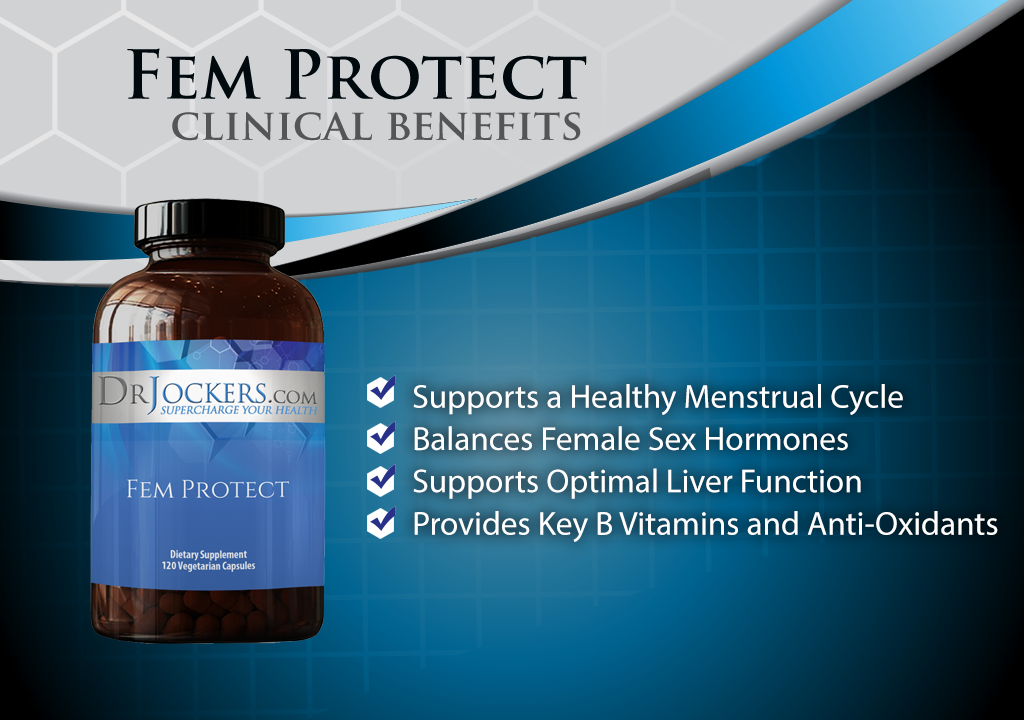









I love the graphics in your articles! It makes things easy to see at a glance. If I have more time, I can read in between the pictures, but if not, the pictures give me at least an idea. Keep up the excellent articles!
Thank you for all your good info. I am curious why you would have or recommend skullcap in the liver formula. Skullcap is Not good for our liver.
Are all these ingredients certified organic.?
With appreciation
Diane
Your graphic for women’s hip ratio says “Ration” instead of “Ratio”. Just sayin’.
100% no gluten/protein helps me sleep. Gluten is in wheat/barley/rye…oats/corn/rice. Rice is low in gluten. Wild rice/buckwheat have no gluten. LDN may help block some gluten. Hidden gluten is common.